
Paraphrasing Tool
AI Paraphraser

Action Verbs: What They Are and How to Use Them
February 19, 2024
Andrew Dinu
Verbs are the backbone of sentences, and action verbs, in particular, add movement and dynamism to our language. In this blog post, we’ll break down what action verbs are, provide examples to illustrate their use, and discuss how they differ from stative and linking verbs.
What are Action Verbs?
Action verbs are the type of verb , these are words that express physical or mental actions. These verbs describe what a subject does, bringing a sense of activity and motion to our sentences.
Examples of Action Verbs:
Let’s take a look at some straightforward examples of action verbs:
These examples show how action verbs (run, jump, write, eat) can depict various activities in different tenses.
What are the Types of Action Verbs?
Action verbs can be categorized into several types based on the kind of action they describe. Here are some common types of action verbs:
Physical Action Verbs:
- These verbs describe actions that involve physical movement or activity.
- Examples: run, jump, walk, swim, dance, climb, lift, kick.
Mental Action Verbs:
- These verbs describe actions related to mental processes, such as thinking, learning, or understanding.
- Examples: think, learn, understand, analyze, imagine, remember.
Communication Action Verbs:
- Verbs that involve the exchange of information or communication.
- Examples: talk, speak, write, read, listen, discuss.
Creation Action Verbs:
- Verbs that describe the act of creating or producing something.
- Examples: create, build, design, compose, craft, paint.
Emotional Action Verbs:
- Verbs that express emotions or reactions.
- Examples: smile, laugh, cry, cheer, sigh, frown.
Consumption Action Verbs:
- Verbs related to consuming or using something.
- Examples: eat, drink, taste, consume, use.
Motion Action Verbs:
- Verbs that describe various types of movement.
- Examples: move, travel, navigate, drive, fly.
Manipulation Action Verbs:
- Verbs related to handling or manipulating objects.
- Examples: handle, manipulate, lift, carry, push, pull.
Social Action Verbs:
- Verbs related to social interactions and relationships.
- Examples: meet, greet, socialize, collaborate, connect.
Performance Action Verbs:
- Verbs related to performing activities or tasks.
- Examples: perform, execute, accomplish, complete, achieve.
List of Action Verbs:
Here’s a list of action verbs to help you express various activities and movements:
Action Verbs vs. Stative Verbs:
Action verbs describe actions, while stative verbs convey static states or conditions. Let’s compare some examples:
Action Verbs Examples:
- The cat chases the mouse.
- She creates beautiful paintings.
- We play soccer every weekend.
Stative Verbs Examples:
- He knows the answer.
- She owns a lovely house.
- They understand the concept.
As seen in these examples, action verbs represent dynamic activities, while stative verbs express unchanging states or conditions.
Linking Verbs vs. Action Verbs:
Linking verbs , unlike action verbs, connect the subject to a complement but don’t express action. Here’s a quick comparison:
- The flowers bloomed beautifully.
- He solved the puzzle.
- They laughed at the joke.
Linking Verbs Examples:
- The flowers are beautiful.
- He seemed confused.
- They became friends.
Linking verbs (are, seemed, became) link the subject to the complement without indicating action.
Q: What are action verbs?
Action verbs, or dynamic verbs, express physical or mental actions, adding vitality to sentences. Examples include run, jump, and eat.
Q: What types of action verbs exist?
Action verbs categorize into physical (run), mental (think), communication (talk), creation (create), emotional (smile), consumption (eat), motion (move), manipulation (handle), social (meet), and performance (perform) verbs.
Q: How do action verbs differ from stative verbs?
Action verbs depict dynamic activities (e.g., play soccer), while stative verbs convey unchanging states or conditions (e.g., know the answer).
Q: How are linking verbs distinct from action verbs?
Linking verbs (e.g., are, seemed) connect subjects to complements without indicating action, unlike action verbs that express dynamic activities.
Conclusion:
Understanding action verbs enhances your ability to communicate effectively. By discerning action verbs from stative and linking verbs, you can craft clearer and more engaging sentences. So, the next time you want your writing to pack a punch, consider the impact of action verbs!
Related posts:
Transitive and Intransitive Verbs: What’s the difference?
Linking Verbs: Definition and Examples
- Phrasal Verbs: Everything you need to know
- Infinitive Verbs: what are they and how to use them?
- Regular verb vs. irregular verb
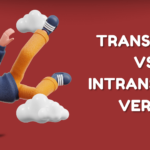
Paraphraser.co - The Best and Free AI Paraphraser
Address: New York, United States
Get To Know Us
Privacy Policy
Terms and Conditions
©2024 Paraphraser.co
- Clerc Center | PK-12 & Outreach
- KDES | PK-8th Grade School (D.C. Metro Area)
- MSSD | 9th-12th Grade School (Nationwide)
- Gallaudet University Regional Centers
- Parent Advocacy App
- K-12 ASL Content Standards
- National Resources
- Youth Programs
- Academic Bowl
- Battle Of The Books
- National Literary Competition
- Youth Debate Bowl
- Bison Sports Camp
- Discover College and Careers (DC²)
- Financial Wizards
- Immerse Into ASL
- Alumni Relations
- Alumni Association
- Homecoming Weekend
- Class Giving
- Get Tickets / BisonPass
- Sport Calendars
- Cross Country
- Swimming & Diving
- Track & Field
- Indoor Track & Field
- Cheerleading
- Winter Cheerleading
- Human Resources
- Plan a Visit
- Request Info

- Areas of Study
- Accessible Human-Centered Computing
- American Sign Language
- Art and Media Design
- Communication Studies
- Data Science
- Deaf Studies
- Early Intervention Studies Graduate Programs
- Educational Neuroscience
- Hearing, Speech, and Language Sciences
- Information Technology
- International Development
- Interpretation and Translation
- Linguistics
- Mathematics
- Philosophy and Religion
- Physical Education & Recreation
- Public Affairs
- Public Health
- Sexuality and Gender Studies
- Social Work
- Theatre and Dance
- World Languages and Cultures
- B.A. in American Sign Language
- B.A. in Art and Media Design
- B.A. in Biology
- B.A. in Communication Studies
- B.A. in Communication Studies for Online Degree Completion Program
- B.A. in Deaf Studies
- B.A. in Deaf Studies for Online Degree Completion Program
- B.A. in Education with a Specialization in Early Childhood Education
- B.A. in Education with a Specialization in Elementary Education
- B.A. in English
- B.A. in Government
- B.A. in Government with a Specialization in Law
- B.A. in History
- B.A. in Interdisciplinary Spanish
- B.A. in International Studies
- B.A. in Interpretation
- B.A. in Mathematics
- B.A. in Philosophy
- B.A. in Psychology
- B.A. in Psychology for Online Degree Completion Program
- B.A. in Social Work (BSW)
- B.A. in Sociology
- B.A. in Sociology with a concentration in Criminology
- B.A. in Theatre Arts: Production/Performance
- B.A. or B.S. in Education with a Specialization in Secondary Education: Science, English, Mathematics or Social Studies
- B.S in Risk Management and Insurance
- B.S. in Accounting
- B.S. in Accounting for Online Degree Completion Program
- B.S. in Biology
- B.S. in Business Administration
- B.S. in Business Administration for Online Degree Completion Program
- B.S. in Information Technology
- B.S. in Mathematics
- B.S. in Physical Education and Recreation
- B.S. In Public Health
- General Education
- Honors Program
- Peace Corps Prep program
- Self-Directed Major
- M.A. in Counseling: Clinical Mental Health Counseling
- M.A. in Counseling: School Counseling
- M.A. in Deaf Education
- M.A. in Deaf Education Studies
- M.A. in Deaf Studies: Cultural Studies
- M.A. in Deaf Studies: Language and Human Rights
- M.A. in Early Childhood Education and Deaf Education
- M.A. in Early Intervention Studies
- M.A. in Elementary Education and Deaf Education
- M.A. in International Development
- M.A. in Interpretation: Combined Interpreting Practice and Research
- M.A. in Interpretation: Interpreting Research
- M.A. in Linguistics
- M.A. in Secondary Education and Deaf Education
- M.A. in Sign Language Education
- M.S. in Accessible Human-Centered Computing
- M.S. in Speech-Language Pathology
- Master of Social Work (MSW)
- Au.D. in Audiology
- Ed.D. in Transformational Leadership and Administration in Deaf Education
- Ph.D. in Clinical Psychology
- Ph.D. in Critical Studies in the Education of Deaf Learners
- Ph.D. in Hearing, Speech, and Language Sciences
- Ph.D. in Linguistics
- Ph.D. in Translation and Interpreting Studies
- Ph.D. Program in Educational Neuroscience (PEN)
- Individual Courses and Training
- Summer On-Campus Courses
- Summer Online Courses
- Certificates
- Certificate in Sexuality and Gender Studies
- Educating Deaf Students with Disabilities (online, post-bachelor’s)
- American Sign Language and English Bilingual Early Childhood Deaf Education: Birth to 5 (online, post-bachelor’s)
- Peer Mentor Training (low-residency/hybrid, post-bachelor’s)
- Early Intervention Studies Graduate Certificate
- Online Degree Programs
- ODCP Minor in Communication Studies
- ODCP Minor in Deaf Studies
- ODCP Minor in Psychology
- ODCP Minor in Writing
- Online Degree Program General Education Curriculum
- University Capstone Honors for Online Degree Completion Program
Quick Links
- PK-12 & Outreach
- NSO Schedule

Action Verbs and Linking Verbs
202.448-7036
Action Verbs
An action verb describes an action, such as:
The sentence pattern will be:
SUBJECT → ACTION VERB → THE REST OF THE SENTENCE
(noun, pronoun, or noun phrase) → (verb) → (adjective, adverb, noun, prepositional phrase, etc.)
Examples of action verbs in sentences:
Greg is kicking the ball now.
The action verb is Kicking. It describes what Greg is doing.
The wind blows constantly in Chicago.
The action verb is Blows. It describes what the wind does.
He accepted my apology.
The action verb is Accepted. It describes what he did.
Linking Verbs
A linking verb links (connects) the subject of the sentence to information about that subject. Linking verbs do not describe action.
The sentence structure will be:
SUBJECT → LINKING VERB → INFORMATION ABOUT THE SUBJECT
(noun, pronoun, or noun phrase) → (verb) → (adjective, noun, or complement)
Some verbs are always linking verbs because they never describe an action. Others can be linking verbs in some sentences and action verbs in different sentences. (See below for examples.)
The following are always linking verbs:
- To be: (is, am, are, was, were, has been, have been, had been, is being, are being, was being, will have been, etc.)
- To become: (become, becomes, became, has become, have become, had become, will become, will have become, etc.)
- To seem: (seemed, seeming, seems, has seemed, have seemed, had seemed, is seeming, are seeming, was seeming, were seeming, will seem)
Here are some examples of linking verbs that are ALWAYS linking verbs in sentences:
The ball is red.
” Is” links the subject “ball” to information about that subject (that it is red).
The children are smart.
“Are” connects the subject “children” to information about that subject (that they are smart).
The child will be tall five years from now.
“Will be” links “child” to the information that she will be “tall five years from now.”
The cat seems fine.
“Seems” links “cat” with information about the cat (that it is fine).
The dog became thin after his surgery.
“Became” links “dog” with information about it (that he became thin).
Words that can be action verbs and linking verbs
There are verbs that, in some sentences, are linking verbs but, in other sentences, are action verbs. These include:
One way to determine whether the verb is functioning as an action verb or a linking verb is to substitute the word “Is” for the verb in question. If the sentence still makes sense, then it is probably a linking verb. If the sentence would not make sense with the word “Is,” then it is probably serving as an action verb.
Jane appeared uninjured after the accident.
You could substitute the word “is” for the word Appeared, and the sentence would still make sense: “Jane is uninjured after the accident.” This lets you know that Appeared is a linking verb here.
Before I could leave, Jane appeared.
In this sentence, Appeared is not linking anything. It is telling the action that Jane did. She appeared, or showed up.
The cake smells good!
This sentence describes the cake. Smells is a linking verb in this sentence. It connects the subject “cake” with information about that subject (that it smells good).
Ellen smells the cake.
The word Smells is not linking anything. If you replaced Smells with “Is,” the sentence would not make sense. That means Smells must be an action verb in this sentence. Ellen performed the action of smelling the cake.
The woman grew silent.
This sentence may seem confusing. Remember that Grow has more than one meaning! In this sentence, Grew means became. The woman became silent.
The gardener grew some flowers.
The word Grew is not linking two things together here. If you tried to replace Grew with “Is,” the sentence would not make sense. This means that Grew must be an action verb. The gardener performed the action of growing some flowers.
Grammar and Vocabulary
202-448-7036
At a Glance
- Quick Facts
- University Leadership
- History & Traditions
- Accreditation
- Consumer Information
- Our 10-Year Vision: The Gallaudet Promise
- Annual Report of Achievements (ARA)
- The Signing Ecosystem
- Not Your Average University
Our Community
- Library & Archives
- Technology Support
- Interpreting Requests
- Ombuds Support
- Health and Wellness Programs
- Profile & Web Edits
Visit Gallaudet
- Explore Our Campus
- Virtual Tour
- Maps & Directions
- Shuttle Bus Schedule
- Kellogg Conference Hotel
- Welcome Center
- National Deaf Life Museum
- Apple Guide Maps
Engage Today
- Work at Gallaudet / Clerc Center
- Social Media Channels
- University Wide Events
- Sponsorship Requests
- Data Requests
- Media Inquiries
- Gallaudet Today Magazine
- Giving at Gallaudet
- Financial Aid
- Registrar’s Office
- Residence Life & Housing
- Safety & Security
- Undergraduate Admissions
- Graduate Admissions
- University Communications
- Clerc Center

Gallaudet University, chartered in 1864, is a private university for deaf and hard of hearing students.
Copyright © 2024 Gallaudet University. All rights reserved.
- Accessibility
- Cookie Consent Notice
- Privacy Policy
- File a Report
800 Florida Avenue NE, Washington, D.C. 20002
- Student Login:

#241: 26 Must-Have English Phrasal Verbs for Travel
Jun 1, 2022 | Advanced Vocabulary , Phrasal Verbs

What is the right way or the best way to learn English phrasal verbs ?
The answer is simple. Themes.
Just like the theme of “travel” for this lesson phrasal verb lesson.
The reason themes work is you’re going to learn phrasal verbs that are regularly used in spoken and written communication on that topic.
With a theme like travel, for example, this means you’ll hear the same phrasal verbs again and again when your coworkers talk about their vacation plans.
You’ll hear them and see them when you’re planning your trip (if you’re doing research in English).
And they’ll be used when people ask about your travel plans and you tell your travel stories.
That repetition is the key to learning and remembering. Plus, when you choose a theme that is applicable to your life, you’re more likely to use those phrasal verbs regularly.
So let’s dive into 26 Must-Have English Phrasal Verbs for Travel.
To help you and I stay organized and have clearer topics (since travel is such a large theme), I’ve divided this into 5 parts or subtopics.
Part 1 – Phrasal Verbs to Use When Booking/Planning Your Trip
- Part 2 – Phrasal Verbs When Using Transportation
- Part 4 – Phrasal Verbs for the Hotel/Airport
- Part 5 – Phrasal Verbs When At Your Destination
26 Must-Have English Phrasal Verbs for Travel
Get away – To leave and go somewhere for a break or holiday
- Ex. “You need to get away for a few weeks and recharge your batteries.
Dream of – To think about or wish for something you want very much
- Ex. “I’m dreaming of going to the beach this summer. I just want to relax and enjoy the waves.”
Sock away – To save money by putting it in a bank or investing it
- Ex. “In the past year alone, he had socked away enough for a trip to Portugal.”
Rack up – To gradually accumulate a large number or points, profits, etc.
- Ex. “I managed to rack up enough airlines points for a free trip.”
Hook up – To get someone in contact with another or to successfully get something they need
- Ex. “Our travel agent hooked us up with first class tickets for our journey back to the States.”
Hiked up (prices/cost) – To increase or raise the cost of something
- Ex. “Due to fuel and staff shortages, airlines have hiked up the cost of airfare.”
Figure out (plans) – To solve a problem or discover the answer to a question
- Ex. “We figured out a great way to explore Europe on a budget.”
Look forward – To positively anticipate a future event
- Ex. “My husband is looking forward to next month’s vacation.”
Fall through (past tense) – To come to nothing or fail
- Ex. “Our travel plans fell through due to a family emergency.”
Part 2 – Phrasal Verbs for Transportation
Get into – To enter a car
- Ex. “We got into the car and drove to the nearest hotel.”
Get off – To exit a bus, train, or plane
- Ex. “We got off the plane an hour ago, but got held up with finding our luggage.”
Get on – To enter, or board, a bus, train, or plane
- Ex. “When the gates are closed, we can no longer get on the plane.”
Back up – To move in the reverse direction
- Ex. “Could you help me? I need help with backing up the van.”
However , it also means to accumulate due to disruption of flow.
- Ex. “The traffic is starting to back up in this lane.”
Pull up – To bring a vehicle to a stop (often a car).
- Ex. “The car pulled up by the passenger pick-up area.”
Pick up – To go someplace to get someone and provide them with transportation
- Ex. “Monica needs to pick Chandler up from the airport today.”
Hold up – To be delayed by something
- Ex. “Sorry, we got held up by traffic on the way here.”
Drop off – To take someone to a place and leave them there
- Ex. “Monica needs to drop Chandler off at the airport.”
See off – To be present at a departure area (i.e. bus station, airport terminal, or train station) and say goodbye to someone
- Ex. “We’ll see you off before your move to Vancouver.”
TIP: Curious about the difference between to get in and to get on ? Check out my lesson on English Prepositions of Place: In | At | On .
Part 3 – Phrasal Verbs for the Hotel/Airport
Check in – To officially tell someone of one’s arrival at a hotel or airport for a reservation
- Ex. “Once we’ve checked in at the hotel, we can explore the city.”
Check out – To leave a place (usually a hotel) by returning accommodation keys and paying outstanding charges
- Ex. “If guests don’t check out by 3:00 PM, they’ll be charged an additional fee.”
Take off – To leave the ground and begin to ascend
- Ex. “The plane takes off once passengers have boarded.”
Touch down – To descend the wheels and land on the ground
- Ex. “Aunt Lola’s plan will touch down at 5:45 PM.”
Part 4 – Phrasal Verbs When At Your Destination
Look around – To explore what is near you in an area
- Ex. “Do you wanna look around for a good place to eat?”
Get around – To go or travel to different places
- Ex. “Despite the gloomy weather, we were able to get around and explore.”
Head for/toward – To begin moving in the direction of a particular place
- Ex. “We decided to head toward the meeting point.”
Head back – To begin returning to a place
- Ex. “I think I’ll head back to the hotel; I’m feeling tired.”
After you watch the video on English phrasal verbs for travel, be sure to follow my recommendation for how to best learn and remember phrasal verbs in English.
Choose 2-3 new phrasal verbs from this lesson today.
Use them in your own example sentences.
Then continue to read or learn about the topic of travel in English this week.
You’ll notice the same phrasal verbs time and time again.
When you encounter a phrasal verb from this list, look at how it is used. This will help you know how to use the phrasal verb in different sentences.
Be sure to share some of your examples with me as well. You can do that in the comment section below.
~ Annemarie
P.S. Are you looking for a community to provide support, help you stay motivated, and guarantee that you grow? Check out our Confident Women Community .

Get the Confidence to Say What You Want in English
Follow my 3-step solution to speak English with clarity, fluency, and freedom so you can say what you want with confidence.
You'll also get my Confident English lessons delivered by email every Wednesday and occasional information about available courses. You can unsubscribe any time.
More Like This

#309: How to Go Off Topic in English | English Conversation Skills
Learn how to gracefully go off topic in English without losing your audience. Whether you’re in a meeting or chatting with friends, in this lesson we dive deep into the art of smoothly navigating tangents while enhancing your English conversation skills.
![travel an action verb #308: How to Use ‘Though’ in English [+ FREE Worksheet]](https://www.speakconfidentenglish.com/wp-content/uploads/2024/04/How-to-Use-Though-in-English-400x250.png)
#308: How to Use ‘Though’ in English [+ FREE Worksheet]
Learn and practice how to correctly use though, although, even though, and as thought in your English conversations.

#307: How to Use English Abbreviations in Emails, Texts, and Conversations
Follow this comprehensive guide to learn how to use English abbreviations for emails, texts, and conversations.

How to Describe Your Personality in English
Did you know it’s common in daily conversation & in job interviews to hear this question: “So, how would you describe yourself?” — How would you answer the question? Use this lesson to learn real-life English vocabulary for describing personalities in English.

#306: Friendly Ways to Invite Someone in English
Extend invitations in English with phrases that strike the perfect balance between formality, friendliness, and warmth to make your invitations feel genuine and welcoming.

#305: Discover Effective Ways to Talk about Hope in English
Dive deep into the heart of English tenses—past, present, and future—highlighting how ‘hope’ evolves with each so you can talk about your hope in English.
© Copyright 2014-2024 Speak Confident English | Privacy Policy | Terms & Disclaimer | Online Class Policies
Hello Annemarie! Dear teacher, this lesson is extremely rich ;thanks a lot !! I’m sure that everyone had the same feelings of frustration when the Covid-19 was spreading all over the world, we spent months and months without visiting family, friends ! For me, I used to travel three times a year to see my children and grand children ; sincerely I feel like suffocated I need to get away, I’m dreaming of getting the opportunity to travel again, since I socked up enough money, however the tickets prices hiked up, as I used to travel frequently I racked up … Read more »
Hi Raoudha, thank you for your comment. You’re right. Things have changed since the Covid. For many of us, it was challenging. But hopefully, everything will get back to normal, and we will enjoy traveling and meeting with our friends and family again.
Excellent!! I love your way of teaching.
Thank you! I appreciate that you watch my lessons.
Pin It on Pinterest

What is an Action Verb? Definition, Examples of Action Verbs in English
Home » The Writer’s Dictionary » What is an Action Verb? Definition, Examples of Action Verbs in English
Action verb definition: An action verb is a verb that a subject can complete.
What is an Action Verb?
What does action verb mean? An action verb is type of verb . An action verb is a verb that the subject can do.
If a subject can DO the action, it is an action verb.
Action verbs can be in any verb tense .
Action Verb Examples in Sentences
- We responded
- I thought about my response.
Common Action Verbs

In all of these example action verbs, the subject can do them.
Transitive, Intransitive Verbs are Action Verbs

Transitive verbs “transfer” the action to an object . That is, the subject does something to someone or something else through a transitive verb. Transitive verbs will answer the question “to what?” or “to whom?”
Examples of Transitive Verbs:
- Fred hit Ginger. (Fred hit whom ? Ginger.)
- Sarah answered the question. (Sarah answered what ? The question.)
Intransitive verbs do not transfer action and will not have direct objects. Intransitive verbs will not answer the question “to what?” or “to whom?”
Examples of Intransitive Verbs:
- “At the airport” does not answer “what?” or “whom?”.
- “landed” is an intransitive verb.
- “in the pool” does not answer “what?” or “whom?”.
- “swam” is an intransitive verb.
Both transitive and intransitive verbs are action verbs, however. In each example sentence above, the subject is DOING something.
Action vs. Non-action Verbs

Common Non-action Verbs Include:
- sensory verbs: to look, to smell, to taste, to sound
- to consider
Examples in Sentences:
- I own the house.
- She considers her answer.
- We need a new car.
As you can see, there is not action taking place in these sentences. Rather, they are more descriptions of reality, a state of being, a preference, etc.
Action Verbs and Progressive Tenses

Non-action verbs cannot be used in the progressive tense. This is because the progressive tense itself is used for ongoing action. Only an action verb can be used in the progressive tense.
- Incorrect: He is wanting dinner.
- Incorrect: They are seeming friendly.
- Incorrect: She is needing a new phone.
Rather, non-action verbs use the simple present tense.
- Correct: He wants dinner.
- Correct: They seem friendly.
- Correct: She needs a new phone.
Summary: What are Action Verbs?
Define action verb: The definition of action verb is a verb that expresses the action of the subject; a verb that does something and the subject can complete.
In summary,
- Action verbs are any verb that a subject can do.
- Action verbs can be transitive or intransitive verbs.
- Additionally, only action verbs (not non-action verbs) can be used in the progressive tenses.

Action Verbs: Definition, Examples, & Exercises
- The Albert Team
- Last Updated On: March 1, 2022
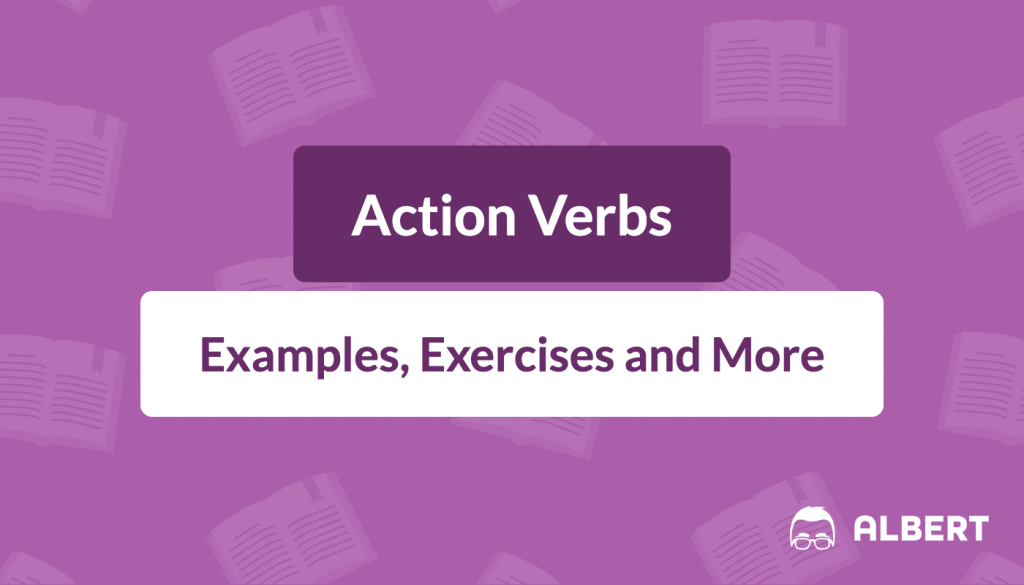
Verbs are an essential part of any sentence. Without verbs, you cannot express a complete thought.
The Merriam Webster dictionary defines a verb as “a word that expresses an action, an occurrence, or a state of being”. These three different functions fall into three different types of verbs: action verbs, linking or “to be” verbs , and auxiliary verbs .
In this blog post, we will focus on learning how to recognize and use action verbs , but you can learn more about the other types of verbs in Albert’s Grammar Course .
When you’re ready, test yourself with a quiz and practice with our high-quality, standards-aligned questions here .
What We Review
The Basics of Action Verbs
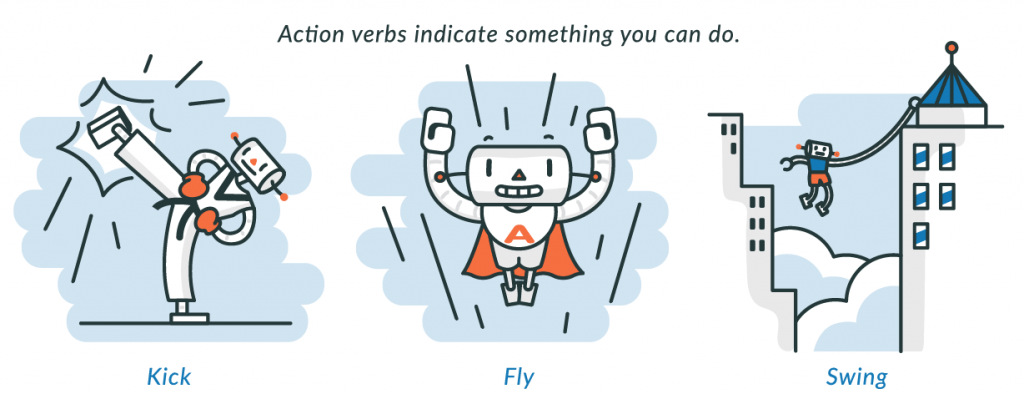
What is an action verb?
An action verb describes an action that a person , animal, object, or process in nature can do. For example, a cheetah chases gazelles across a plain, and the gazelles sprint away, hearing the tall grass rustle underneath the lion’s paws.
In the sentence above, there are several verbs that describe action; the cheetah chases the gazelles, and the gazelles hear the grass rustle and sprint away.

How are action verbs different from auxiliary verbs?
While action verbs are typically the main verb of the sentence and express the action being done by the subject, auxiliary verbs “help” the main action verb by expressing tense, mood, or voice.
For example, if the gazelles were no longer being chased by the cheetah, the sentence would read: The gazelles were chased by the cheetah and would have been caught if the cheetah would not have stubbed his toe on a rock.

Let’s take this sentence apart, because there is a lot going on!
In the sentence above, there are three action verbs: chased, caught, and stubbed .
However, there are also several auxiliary verbs that add meaning to both the action verbs and the overall sentence. These auxiliary verbs are: were, would, have, and been . Were , have , and been are auxiliary verbs that express tense, or when the cheetah chased the gazelles.
The auxiliary verb would expresses possibility. It was very possible that the gazelles would have been the cheetah’s breakfast if the cheetah had not stubbed his toe.
If you want to read more about auxiliary verbs, check out this post on Albert.
How are action verbs different from linking verbs?
Action verbs and linking verbs are alike in that they can both be the main verb of a sentence. However, they are different in that linking verbs cannot show action. Ever. Linking verbs can only show a state of being or condition.
For example, Kevin was tired of asking Joe for his Netflix password, so he finally bought his own subscription.
In this sentence, the linking verb was is the main verb of the first clause. This linking verb “links” or connects the subject, Kevin , to his current state of being, which is tired . There is also an action verb in the second independent clause of this sentence. Because Kevin was tired of bugging his friend, he took action when he bought a Netflix subscription.

What is the relationship between these different types of verbs?
To recap what we learned above, actions verbs and linking verbs can stand on their own in sentences as the main verb, even though they have very different functions. Sentences can have both action and linking verbs in the same sentence, but they have to be in separate clauses.
Here is what it might look like:
When Carlos and Suzanne rode the Haunted Mansion ride at Disney World, Carlos thought he might be scared, but Suzanne assured him that the ride was more silly than scary.
In the sentence above, rode, thought, and assured are all action verbs . Each of these action verbs are connected to a subject. Both was and be are linking verbs . Each of these linking verbs are also connected to their own subjects.
Conversely, action verbs can exist without auxiliary verbs , but auxiliary verbs must be connected to a main verb, whether it is an action or linking verb, to make sense.
Let’s look at the sentence above one more time:
If you look closely, you’ll see that there is an auxiliary verb attached to a linking verb. The auxiliary verb, might, is attached to the linking verb, be .
Two things are going on here: while the linking verb, be, expresses a state of being (Carlos is scared!), the auxiliary verb, might, helps the reader understand that Carlos is not actually scared right now, but there is a possibility that he could be scared later.

How do you use action verbs?
Simply put, writers use action verbs in sentences to express an action done by a person, an animal, an object, or nature.
For example, a postal worker delivering mail, a cat meowing , a ball rolling , or a flower blooming are all action verbs.

Return to the Table of Contents
3 Tips for Understanding Action Verbs
Here are some important tips to help you understand action verbs:

Tip #1. Action verbs must describe an action–not a state of being
- For example, the sentence, “the sun scorched the parched desert sand” uses an action verb to describe an action done by the hot sun.
- You would NOT use an action verb to say that “the sun is hot” because the verb, is , is a linking verb that describes a state of being

Tip #2. Action verbs and linking verbs can be used together, but they must be in separate clauses
- For example, Marcus played Fortnite until 2 in the morning last night, so he was too tired to get up for school the next morning.
- In this sentence, played is an action verb describing an action done by Marcus in the first clause. Then, in the second clause, a linking verb is used to show Marcus’ state of being: Marcus was tired.

Tip #3. Action verbs can be paired with auxiliary verbs to express tense, mood, or voice
- For example, Laura Jean should tell Will that she has feelings for him, but she is too nervous.
- In this sentence, the auxiliary verb, should , shows the reader that Laura Jean has not told Will how she feels about him, but the writer believes that she should.

Applying the Basics: Action Verb Review & Practice
Now that you understand how action verbs are used, review the anchor chart below and complete the review to test your knowledge of these verbs.
The Ultimate List of Action, Linking, and Auxiliary Verb Examples
Refer to the graphic below to learn the difference between these three types of verbs:
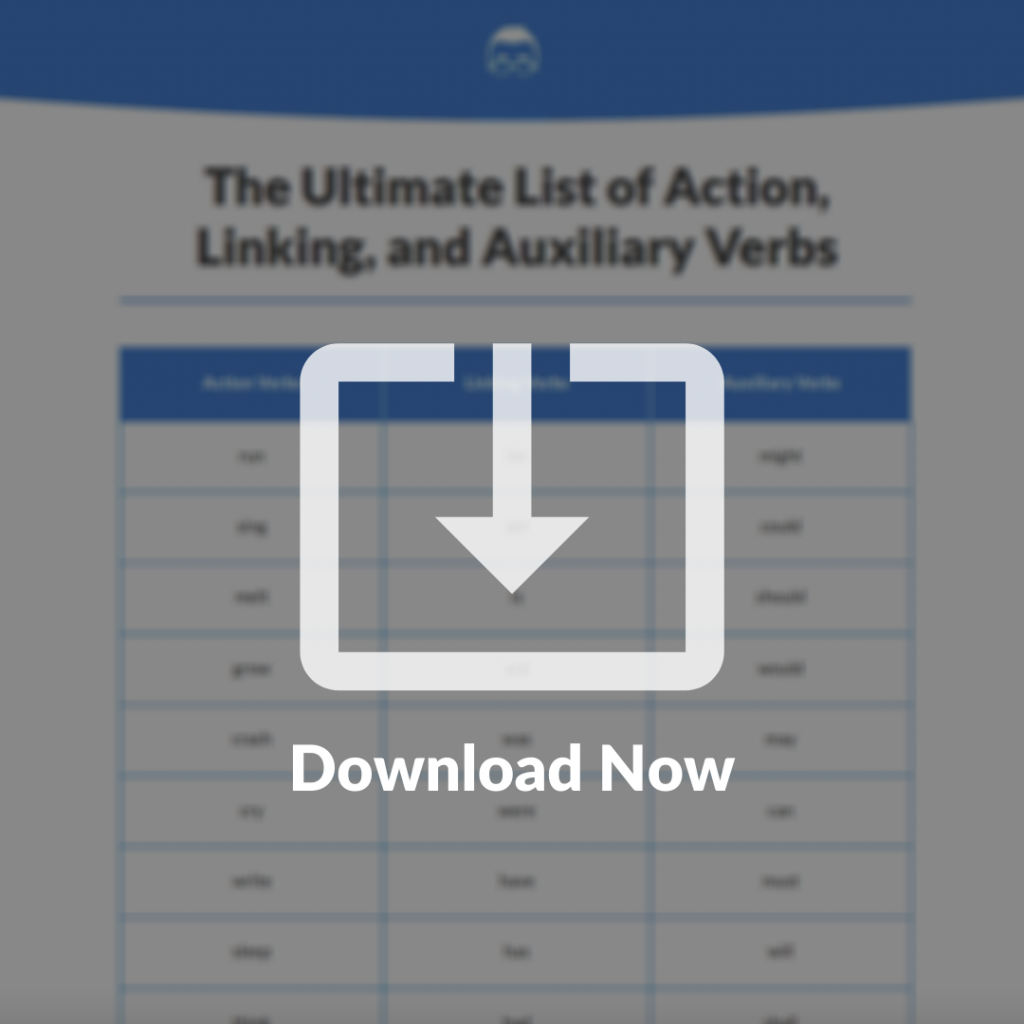
This list, obviously, does not include all action, linking, and auxiliary verbs; however, it is meant to be used as a guide while identifying these types of verbs.
Action Verb Exercises and Review
Now that you know some common action verbs, test your ability to accurately identify these verbs.
Select the action verb(s) in the sentences below. Remember, these verbs must describe action and not a state of being.
1. Esperanza could not wait to celebrate her upcoming quinceanera with her family and closest friends.
- In this sentence, wait is the only action verb . While there are other verbs in this sentence, this is the only one that describes action.

2. The crowd exploded with cheers as the hockey puck slid through the goalie’s legs and into the goal.
- In this sentence , exploded and slid are both examples of action verbs . Exploded describes the loud cheers of the crowd of people, and slid describes how the hockey puck narrowly made it into the goal.
3. Alexis stared gloomily out of her bedroom window as the rain poured down unceasingly.
- In this sentence, both stared and poured are action verbs. Stared describes an action done by Alexis, while poured describes an action performed by the rain.
4. The cat reared its back and hissed through its teeth even though the excited lab only wanted to play.
- In this sentence , reared, hissed, and wanted are all examples of action verbs. Reared and hissed are actions performed by the cat, while wanted expresses an action done by the dog.
5. As the runners approached the final mile, they ignored their screaming legs and pushed themselves even harder.
- In this sentence, approached, ignored, and pushed are all action verbs that describe the runners.

Pro tip : When evaluating whether a verb is an action verb, ask yourself, is this verb describing an action that can be performed by a person, an animal, an object, or nature? If it is not describing an action but rather a state of being, then it is NOT an action verb.
For additional practice, check out Action Verb content on Albert.
Try for Yourself: Action Verbs Quiz

Feeling confident in your understanding of action verbs?
Take this short six-question quiz to see what you’ve learned:
1. Does an action verb have to include an auxiliary or helping verb in order to make sense?
- Answer: No
- Correct Explanation: That’s right! An action verb can stand on its own without an auxiliary verb. Auxiliary verbs are only added if the writer wants to express tense, mood, or voice.
- Incorrect Explanation: Sorry, that’s not right! Remember, an action verb can stand on its own as the main verb of a sentence. While auxiliary verbs can be used with action verbs, they are not required.
2. Can an action verb be used in the same sentence as a linking verb as long as these verbs are in different clauses?
- Answer: Yes
- Correct Explanation: That’s right! Action and linking verbs can be used together in the same sentence, but they must be in separate clauses.
- Incorrect Explanation: Sorry, that’s not right! Remember, both action verbs and linking verbs can both function as the main verb of the sentence. This means that if you have a sentence with multiple independent clauses, you can have more than one main verb.
3. In this sentence, are the underlined words action or linking verbs ?
As she spoke , her lips moved but no sound came out, then suddenly, her hands formed words in sign language as quickly as she mouthed them.
- Answer: Action
- Correct Explanation: That’s right! The verbs spoke, moved, came, formed, and mouthed are all examples of action verbs because they describe actions done by the girl.
- Incorrect Explanation: Sorry, that’s not right! Remember, an action verb must express action while linking verbs must express a state of being.
4. In this sentence, are the underlined words action or linking verbs ?
When he was first rescued, the Pit Bull puppy was scared and trembling, but as soon as he knew he was safe and had a loving home, he was happy.
- Answer: Linking
- Correct Explanation: That’s right! The verbs was and had are linking verbs that connect the subject, the Pit Bull puppy, to his changing state of being.
- Incorrect Explanation: Sorry, that’s not right! Remember, a linking verb connects the subject to a state of being.
5. In this sentence, are the underlined words action or auxiliary verbs ?
The caterpillar burst out of his chrysalis as a radiant butterfly.
- Correct Explanation: That’s right! The verb burst is an example of an action verb because it describes an action done by the caterpillar.
6. In this sentence, are the underlined words action or auxiliary verbs ?
You may go to bed late, but you may not eat five cartons of ice cream.
- Answer: Auxiliary
- Correct Explanation: That’s right! The verb may “helps” the action verbs express permission and is an auxiliary verb .
- Incorrect Explanation: Sorry, that’s not right! Remember, an auxiliary verb must connect to an action or linking verb to make sense, and auxiliary verbs exist to “help” verbs express tense, voice, or mood.
For additional practice with action verbs, check out our practice on Albert: Action Verbs .
Teacher’s Corner for Action Verbs
While it’s true that understanding the difference between these three types of verbs is a foundational grammar skill, the Common Core English Language Progressive Skills Chart shows that even elementary-level skills require regular practice in the upper grades.
The Common Core State Standards site is a great resource that lists specific standards addressing action verbs.
Albert’s action verb practice can easily be implemented in the classroom for various grade levels. These short practice assignments are great for homework, bell work, mini-lessons, and exit tickets.
We also provide full-fledged assessments to evaluate student understanding of these grammatical concepts, but if you prefer, you can select different concepts to craft your own assessments to best fit your students’ needs.
Summary for Action Verbs
Action Verbs describe an action that can be done by a person, an animal, an object, or nature.
Linking Verbs describe a state of being.
Auxiliary Verbs help action and linking verbs by adding tense, mood, or voice to these verbs.
Be sure to check out our grammar course for more action verb practice.
You can also access over 3,400 high-quality questions that address nearly every grammatical concept.
Need help preparing for your Grammar exam?
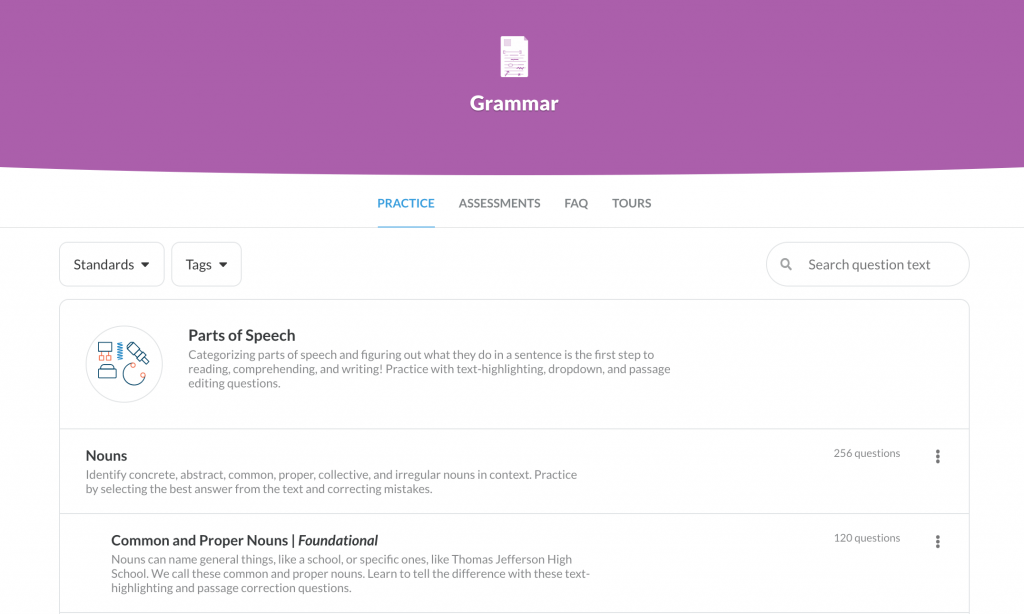
Albert has hundreds of grammar practice questions with detailed explanations to help you master concepts.
Interested in a school license?
Popular posts.

AP® Score Calculators
Simulate how different MCQ and FRQ scores translate into AP® scores

AP® Review Guides
The ultimate review guides for AP® subjects to help you plan and structure your prep.

Core Subject Review Guides
Review the most important topics in Physics and Algebra 1 .

SAT® Score Calculator
See how scores on each section impacts your overall SAT® score

ACT® Score Calculator
See how scores on each section impacts your overall ACT® score

Grammar Review Hub
Comprehensive review of grammar skills

AP® Posters
Download updated posters summarizing the main topics and structure for each AP® exam.

Phrasal Verbs for Travel
- Phrasal Verbs
Today's lesson reviewd and builds on the 7 travel phrasal verbs we studied at a few weeks ago. Look at the these phrasal verbs and their definitions. Fill in the gaps with the correct phrasal verbs so that the text makes sense. (Keep in mind that the main verb changes according to the time and function of the sentence, e.g. drop off in a past passive structure is I was dropped off .
- Drop off - to take someone to a place and leave them there
- Check in - to register at a hotel
- Check out - to leave and pay for your stay at a hotel
- Pick up - to go and fetch someone from a place and take them somewhere else
- Set out - to start a journey
- Take off - when a plane leaves and begins to fly
- Get in - when a plane arrives on an airport
- Get away - to leave to go somewhere for a break or holiday
- Get on - to climb on board
- Speed up - to increase speed
- Look around - to explore what is near you, in your area
- Hurry up - to rush and not waste time
- Go back - to go the place someone is leaving from to say goodbye
- See off - to go the place someone is leaving from to say goodbye
- Look forward - to look forward to something that is going to happen in the future
Summer break in the USA
The day I left for the USA my family (1)___ me___ . We had breakfast on the airport but we had to (2)___ so that I wouldn't miss my flight. It was a teary goodbye, but I was (3)___ to new experiences in the USA. After I (4)___ the plane I made myself comfortable and sent a few last minute goodbye text messages. I thought of how much I wanted this holiday and that I just needed to (5)___ from it all. A short while later the pilot announced that all electronics were to be switched off, for we were preparing to (6)___ . As the plane was (7)___ on the runway I sat back and took pleasure in brute force and strength of the momentum the plane was creating to lift itself up from the ground.
When our plane (8)___ at JFK Airport in New York there was already a taxi waiting to (9)___ me ___ . The taxi (10)___ me ___ at the Holiday Inn where I would meet up with my friends. After I (11)___ to the hotel we all went to Time Square, where we (12)___ for the rest of the day. The next day we got up in the early hours of the morning and did some sightseeing. That night we were exhausted and went to bed early. The next morning we (13) ___ after breakfast, rented a car and (14)___ on a cross-country road trip. It would be another 3 months before I would (15)___ home.
Lesson by Danica, teacher at EC Cape Town English School
Add the correct phrasal verbs into the spaces below. Type in the whole phrasal verb and change the tense when needed .
- Missing phrasal verb 1 is (use 'me' in your answer):
- Missing phrasal verb 2 is:
- Missing phrasal verb 3 is:
- Missing phrasal verb 4 is:
- Missing phrasal verb 5 is:
- Missing phrasal verb 6 is:
- Missing phrasal verb 7 is:
- Missing phrasal verb 8 is:
- Missing phrasal verb 9 is (use 'me' in your answer):
- Missing phrasal verb 10 is (use 'me' in your answer):
- Missing phrasal verb 11 is:
- Missing phrasal verb 12 is:
- Missing phrasal verb 13 is:
- Missing phrasal verb 14 is:
- Missing phrasal verb 15 is:

- Lesson Index

Seven Letters
English language Schools

Mastering Travel Verbs: Your Ultimate Guide to Perfect English Language Usage
November 21, 2022
No Comments
By Derek Cupp
I’m here to help you master travel verbs, the key to smooth sailing in English language usage. Travel verbs are more than just the words we use when jetting off on vacation – they’re a fundamental part of effective communication.
Think about it. When we talk about our day-to-day activities, going places and doing things is often at the heart of our conversations. So, understanding how to confidently use travel verbs can open up new avenues for expressing yourself in English.
In this comprehensive guide, I’ll be your co-pilot on an adventure through the world of travel verbs. Buckle up and get ready to soar – by learning these essential parts of speech, you’ll be navigating the English language with ease in no time!

Unlocking the Mystery: What Are Travel Verbs?
Ever wondered what travel verbs are? Let’s dive into this fascinating subject together.
Travel verbs, as their name suggests, are action words related to journeys or trips. They’re not just about physical movement but also encapsulate experiences encountered during travels. Terms like visit , explore , and arrive are all part of this intriguing category.
As an English language learner or even a seasoned speaker, you might’ve used these verbs without realizing they fall under a specific category – the travel verbs. But knowing about them can add rich depth to your conversations and writings about voyages or excursions.
Here’s the catch; it’s not all cut-and-dried with travel verbs! Why? Because some of these terms share similar meanings yet aren’t interchangeable in every context. For instance, consider depart and leave . While both indicate ‘going away’, there’s a subtle difference in usage:
See how they’re used differently? In casual conversation, we often use “leave” when indicating departure from a particular place (like home). On the other hand, “depart” is more formal and typically associated with scheduled transport services like flights or trains.
It gets even more interesting! Some travel verbs don’t solely apply to physical journeys but also metaphorical ones! An example is “embark,” which can signify starting an adventure OR undertaking a new project.
Embark on a journey – Start a trip.
Embark on a new project – Begin work on something new.
Amazing how versatile our language is, right? Well, that’s just scratching the surface of travel verbs – there’s so much more to explore!
In upcoming sections, we’ll dig deeper into these captivating terms and unravel their diverse applications further! So buckle up as we prepare for this exciting linguistic journey together!
Don’t forget: mastering these expressions will not only enrich your English vocabulary but also make your stories of adventures sound even more compelling!
Diving Deeper: Usage of English Travel Verbs
Time to delve into the world of travel verbs. Now, these aren’t just your typical ‘go’, ‘come’, and ‘stay’. We’re talking about the rich variety that English language offers when it comes to describing our travel experiences. Buckle up for this journey!
Let’s start with some basics that we often overlook. Depart and leave seem interchangeable, right? Not quite! Use ‘depart’ when you refer to starting a journey, particularly from a station or airport. On the other hand, use ‘leave’ for less formal situations or when exiting a place.
Then there are verbs like arrive and reach . While both indicate getting to a destination, they differ subtly in usage. You’d say “I arrived at the airport” but not “I reached at the airport”. Instead, it should be “I reached the airport”.
Now let’s talk about transit verbs – those that describe how we move during our travels. Ever wondered about using drive , ride , or travel correctly? Here’s how:
Drive: Use when someone controls a vehicle. Example: I drove my car to work.
Ride: Prefer this when someone is in/on a vehicle but not controlling it. Example: I rode my bike to work.
That said, remember using these verbs interchangeably isn’t wrong per se; context matters!
And then we have unique cases like ‘sail’ , ‘ fly ‘, and ‘ hike ‘. These are what I call ‘specific situation’ verbs – they’re tied closely with particular means or modes of travel.
Sail can be used for trips on water where sailboats or yachts are involved.
Fly is exclusively used for air travel.
Hike indicates an intense walk usually on trails or mountains.
Mastering these distinctions will take your English language skills to new heights (pun intended). Keep practicing them in relevant contexts until they become second nature! Can’t wait for our next exploration into grammar land? Stay tuned!
Conclusion: Mastering Your Journey with Travel Verbs
Let’s look back at our journey through the exciting world of travel verbs. We’ve navigated the winding roads of English language usage, learning how to wield these powerful tools to express our wanderlust and capture all the nuances of our adventures.
I hope you’re now feeling more confident about using travel verbs in your everyday conversations and writings. Remember, practice makes perfect. Keep exploring different contexts where you can use these verbs and watch as your fluency grows.
Here are some final tips:
Always keep an open mind for new words and expressions.
Practice using them in sentences until they feel natural.
Don’t be afraid to make mistakes – that’s how we learn!
You’ll soon find that mastering travel verbs isn’t just about improving your English skills. It’s also a ticket to a richer understanding of life experiences, people, cultures and places around the globe.
Mastering travel verbs is a journey worth embarking on. With every step you take, you’re not only expanding your vocabulary but also broadening your horizons. So pack up your new knowledge and let it guide you towards exciting linguistic adventures!
In this digital age where global connection is just a click away, having command over travel-related English can open doors to meaningful connections across borders. That’s why I encourage everyone – whether you’re an avid traveler or someone who simply enjoys learning languages – to dive into the sea of travel verbs.
And remember: The journey doesn’t end here! There are countless other aspects of English waiting for exploration.
So get out there and start experimenting with what we’ve learned today about travel verbs! You’ll find that it enhances not only your communication skills but also enriches your understanding of this beautiful world we live in. Safe travels in all your future language-learning journeys!
Comma Before Such As: A Comprehensive Guide to Grammatical Usage
Decoding personality characteristics: a linguistic analysis unveiling hidden traits, leave a comment cancel reply.
Save my name, email, and website in this browser for the next time I comment.
A picture is worth a thousand words
- Adjectives – meaning and examples
- Adverb definition and examples
- Appositive meaning and examples
- Comparative and Superlative definition
- CONJUNCTIONS – meaning and examples
- Gerund definition and examples
- Passive voice definition and examples
- Prepositions in English
- Pronoun meaning and examples
- Punctuation marks in English
- Question Tags – meaning and examples
- Sentence structure
- Used to VS be used to VS get used to – Grammar
- Verbs – definition and examples
- Tense structures in English
- Idioms with adjectives
- Animal idioms and expressions
- Body idioms and expressions
- Business idioms and expressions
- Clothes idioms and expressions
- Colour idioms and expressions
- Education idioms and expressions
- Family idioms and expressions
- Food and drink expressions
- Health idioms and expressions
- Household items idioms and expressions
- Love and relationship idioms
- Money idioms and expressions
- Music idioms and sayings
- Nature idioms and expressions
- Number idioms and expressions
- People idioms and expressions
- Prepositional phrases meaning and examples
- Shape idioms and expressions
- Sports idioms and sayings
- Time idioms and expressions
- Travel idioms and expressions
- Idioms with Verbs
- Weather idioms and expressions
- Phrasal verbs A – B
- Phrasal verbs C – D
- Phrasal verbs E – F
- Phrasal verbs G – H
- Phrasal verbs I – J
- Phrasal verbs K – L
- Phrasal verbs M – N
- Phrasal verbs O – P
- Phrasal verbs Q – R
- Phrasal verbs S – T
- Phrasal verbs U – V
- Phrasal verbs W – Z
- Phrasal verbs groups
- Pronouncing ‘b’ and ‘v’
- Pronouncing ‘ache’
- Pronouncing ‘ch’
- Contraction pronunciation
- Pronouncing ‘d’ as a ‘j’
- Hard words to pronounce
- Pronouncing g, j and y in English
- Glottal stop meaning and examples
- Pronouncing ‘oo’
- Pronouncing ‘ough’
- Silent letters in English
- Word and sentence stress
- Pronouncing ‘table’ words
- Pronunciation tips
- Pronouncing the ‘t’ as a ‘ch’
- Voiced and voiceless (unvoiced) sounds
- Vowel pronunciation in English
- Alphabetical List Of Proverbs | A – C
- Alphabetical List Of Proverbs | D – F
- Alphabetical List Of Proverbs | G – I
- Alphabetical List Of Proverbs | J – L
- Alphabetical List Of Proverbs | M – O
- Alphabetical List Of Proverbs | P – R
- Alphabetical List Of Proverbs | S – U
- Alphabetical List Of Proverbs | V – Z
- Useful Tips & Infomation
- Test Your Knowledge
- English Grammar
- Idioms & Expressions
- Phrasal Verbs
- Pronunciation Tips
- English Proverbs
- Test Yourself
- Tips to improve your English
- Action verb definition and examples
involves a physical action
What is an action verb, examples of action verbs.
Action verbs are verbs which express a physical action/movement. The action verb tells us what the subject of the sentence is doing.
We do hundreds if not thousands of actions every day. Let me tell you about my morning routine: I wake up then I get up. I make breakfast then eat it. I shower then clean my teeth etc. All of these are physical actions.
Action verbs can be regular and irregular .
Take a look at some examples of action verbs below.
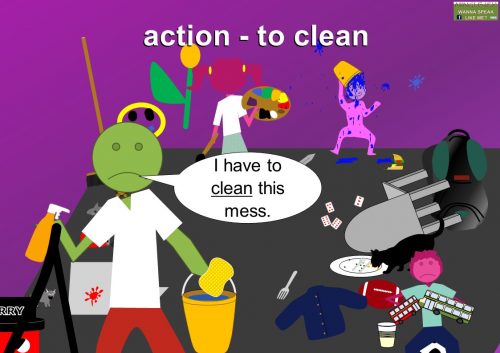
An Artificial Intelligent English Learning Platform
Action or Dynamic Verbs
What are action or dynamic verbs.
Action or dynamic verbs, also known as active or event verbs, are used to indicate an action or physical activity. Action verbs are different from stative verbs, which express states of being or conditions, and from linking verbs which function as bridges that link subjects to subject complements. Let’s look at the following sentences:
- The railing is iron.
- My friends hate anchovies in their pizza.
In the first sentence, the verb “is” serves as a linking verb. It connects the subject “railing” to the adjective “green.” In the second sentence, the verb “hates” functions as a stative verb. You have to analyze that there is no actual physical activity involved, but rather an expression of feeling. Now let’s look at the following sentences that use action verbs:
- Benjamin’s kids ran to the front yard to meet him.
- We watched horror movies the whole day.
- In root form, the plant acts as an anti-inflammatory.
- Most American children leave home when they come of age.
- She presented her analysis of child speech at the convention.
Action or Dynamic Verbs Rules and Uses
Study the following table of general rules for action or dynamic verbs:
Examples of Action or Dynamic Verbs
1. My younger cousins were enjoying the slides at the water park.
2. Will Shawn and his girlfriend stay in the upstairs guest room?
3. You may need to contact your supplier to confirm the arrival.
4. Could you take these gift packs to the Gucci flagship downtown?
5. Payton picked tangerines with her bosses at the bed and breakfast.
6. I flipped the eggs successfully when I was cooking earlier.
7. She is pouring a lot of honey on her pancakes.
8. Yes, I have visited the northern countryside but it was too hot when I did.
9. Jin was slicing the kimbap carefully while I was setting the table.
10. That’s so dumb! You could have hit an electrical wire inside the wall.
11. Akira watched closely as Lyle ate because he likes the way she munches.
12. It’s so slippery up there that the repairman almost fell from the roof.
13. The yoga instructor was instructing us in a very military way.
14. Miranda clapped the loudest when her son’s name was announced.
15. They were frightened by the prank and they screamed bloody murder.
Action or Dynamic Verbs Exercises with Answers
Exercise on action or dynamic verbs.
Identify if the verbs in bold are action verbs or stative verbs.
1. They seem to be getting along quite well.
2. Ravi called the insurance company to inquire about his claim.
3. Could you come closer to the mic, please?
4. He rummaged through the drawer looking for the document.
5. My 5-year-old daughter really likes sushi for some reason.
6. Gian will request the use of the clubhouse for the convention.
7. Yu mi appears to be distracted as soon as she arrived at the arena
8. Min-jung deserves to be treated better by her colleagues.
9. Helen had operated similar equipment when she worked in the States.
10. We noticed that the area smelled strange, like something chemical.
1. They seem to be getting along quite well. – stative verb
2. Ravi called the insurance company to inquire about his claim. – active verb
3. Could you come closer to the mic, please? – active verb
4. He rummaged through the drawer looking for the document. – active verb
5. My 5-year-old daughter really likes sushi for some reason. – stative verb
6. Gian will request the use of the clubhouse for the convention. – active verb
7. Yu mi appears to be distracted as soon as she arrived at the arena. – stative verb
8. Min-jung deserves to be treated better by her colleagues. – stative verb
9. Helen had operated similar equipment when she worked in the States. – active verb
10. We noticed that the area smelled strange, like something chemical. – stative verb
Action or Dynamic Verbs List
Below is a list of common active verbs in alphabetical order.
Advice for ESL Students & English Language Learners
Verbs are widely used in English. They drive sentences forward and show action or conditions. Broken down to the simplest grammatical forms, it’s possible to express thoughts and ideas with only a noun and a verb. “I studied”, for example, is a complete sentence. Action or dynamic verbs are the easiest types of verbs to learn. However, they aren’t without rules. Verb tenses, voice, and mood are all important factors that create accurate communication. Below is a list of useful advice that every English language learner should consider to reach their language goals:
1. Use Grammar Lists
Grammar lists, tables, and charts can be lengthy and overwhelm students, but they’re crucial in self-studying. They aid in understanding the basics of various grammar concepts. Although it’s important to note that they aren’t the be-all and end-all of learning English grammar, these learning tools are nonetheless valuable because they help maximize what you can achieve in self-directed instruction. They simplify rules and formats and can include real-world sentence examples. They’re also readily available when you need to compare, refer to, and review multiple grammatical topics.
2. Use Audio-Visual Resources
The time you spend in English classes is limited and not at all enough for achieving advanced proficiency within a certain period. Self-studying is a necessity. It’s important to acquire exposure to how native English speakers use the language in different situations and for different needs. Audio and video materials can exhibit limitless and functional material. These resources will easily increase your background knowledge in both academic and informal English. Use these resources with intention, which means active listening and purposeful consumption. Many English language learners can attest to reaching advanced fluency by mimicking their favorite TV show characters or listening to their favorite podcast hosts.
3. Practical Use
Books aren’t enough. If you have minimal English interactions, you can be an expert in grammar and still struggle with actual speech. Language theory without practical use is extremely limiting, with proficiency levels contained only in the domain of reading and writing. So speak or talk whenever you have the chance, both with native and non-native English speakers. If there aren’t so many chances to do that, make an effort to organize a study group, or cultivate friendships with fellow English language learners or speakers. Regular and consistent English conversation is the major pathway to speaking fluently.
Additionally, it is important for learners to properly understand stative verbs and types of verbs .
Common Errors Made by English Learners
As mentioned, stative verbs don’t normally assume continuous verb tenses. But this rule doesn’t apply to all stative verbs, which is where the confusion for many English language learners originates. The common errors stem from being unable to distinguish between the two functions. The table below shows commonly used verbs that can function both as stative and dynamic (action or active) verbs. It contains examples to show their proper usage. Study them to avoid using them incorrectly.
Learning Strategies and Best Practices with Action or Dynamic Verbs
The following table lists the best practices for using action or dynamic verbs accurately and efficiently:
Action or Dynamic Verbs Frequently Asked Questions
There are 3 main verb tenses (the past, the present, and the future tenses) and 4 aspects.
The present tense describes things happening regularly or in the present. The past tense describes things that have already happened. The future tense describes things that have yet to take place.
The following are 4 aspects that comprise each main verb tense:
1. Simple 2. Progressive 3. Perfect 4. Perfect Progressive
Articles are a type of word derived from verbs with various functions such as adjectives or verb tense forms. There are two types of participles: present and past. Present participles are used in progressive tenses while past participles are used in perfect tenses. They go with their proper auxiliary or helping verbs.
Learning the main uses of tenses is one step toward learning perfectly. Make use of learning resources like language lists, charts, and tables to master grammar rules. Then, engage in constant practice by writing sentences during your study time and utilizing them in actual conversations and writing.
A verb is stative if it indicates a condition or a state of being instead of an action. You must analyze the context of the verb and see if there’s a physical movement involved. The word “like,” for example doesn’t exactly describe an action. It describes an emotion, which makes it a stative verb.
Dynamic, action or active verbs are all terms for verbs that show action. On the other hand, verbs that describe states of being and don’t involve actions at all are stative verbs.
Learn from History – Follow the Science – Listen to the Experts
For learners of all ages striving to improve their English, LillyPad combines the most scientifically studied and recommended path to achieving English fluency and proficiency with today’s most brilliant technologies!
What’s the one thing that makes LillyPad so special? Lilly! Lilly’s a personal English tutor, and has people talking all over the world! Lilly makes improving your English easy. With Lilly, you can read in four different ways, and you can read just about anything you love. And learning with Lilly, well that’s what you call liberating!
Additionally, the platform incorporates goal-setting capabilities, essential tracking & reporting, gamification, anywhere-anytime convenience, and significant cost savings compared to traditional tutoring methodologies.
At LillyPad , everything we do is focused on delivering a personalized journey that is meaningful and life-changing for our members. LillyPad isn’t just the next chapter in English learning…
…it’s a whole new story!
Do you want to improve your English? Visit www.lillypad.ai .
Follow us on Facebook or Instagram !
© 2023 LillyPad.Ai
Conjugation verb travel
Model : cancel
Auxiliary : have , be
Other forms: travel oneself / not travel
Contractions
in the U.K. spelling we double up the 'l' in preterite and participle endings
The verb has several variants of conjugation, which may correspond to different meanings. Please use the menu to select one or all variants.
- he/she/it travels
- they travel
- I travelled/traveled
- you travelled/traveled
- he/she/it travelled/traveled
- we travelled/traveled
- they travelled/traveled
Present continuous
- I am travelling/traveling
- you are travelling/traveling
- he/she/it is travelling/traveling
- we are travelling/traveling
- they are travelling/traveling
Present perfect
- I have travelled/traveled
- you have travelled/traveled
- he/she/it has travelled/traveled
- we have travelled/traveled
- they have travelled/traveled
- I will travel
- you will travel
- he/she/it will travel
- we will travel
- they will travel
Future perfect
- I will have travelled/traveled
- you will have travelled/traveled
- he/she/it will have travelled/traveled
- we will have travelled/traveled
- they will have travelled/traveled
Past continous
- I was travelling/traveling
- you were travelling/traveling
- he/she/it was travelling/traveling
- we were travelling/traveling
- they were travelling/traveling
Past perfect
- I had travelled/traveled
- you had travelled/traveled
- he/she/it had travelled/traveled
- we had travelled/traveled
- they had travelled/traveled
Future continuous
- I will be travelling/traveling
- you will be travelling/traveling
- he/she/it will be travelling/traveling
- we will be travelling/traveling
- they will be travelling/traveling
Present perfect continuous
- I have been travelling/traveling
- you have been travelling/traveling
- he/she/it has been travelling/traveling
- we have been travelling/traveling
- they have been travelling/traveling
Past perfect continuous
- I had been travelling/traveling
- you had been travelling/traveling
- he/she/it had been travelling/traveling
- we had been travelling/traveling
- they had been travelling/traveling
Future perfect continuous
- I will have been travelling/traveling
- you will have been travelling/traveling
- he/she/it will have been travelling/traveling
- we will have been travelling/traveling
- they will have been travelling/traveling
- let's travel
- travelling/traveling
- travelled/traveled
Perfect participle
- having travelled/traveled
Helping millions of people and large organizations communicate more efficiently and precisely in all languages.

Past Tense of Travel: Traveling Back in Time
By: Author Oliver
Posted on Last updated: August 12, 2023
Sharing is caring!
Welcome to our article on the past tense of travel! If you’re learning English grammar, you know that understanding verb tenses is an essential part of the language. The past tense is particularly important, as it allows us to talk about events and experiences that have already happened. In this article, we’ll explore the basics of English tenses, give an overview of the past tense, and focus specifically on how to use the past tense when talking about travel.
Travel is one of the most common topics of conversation, and being able to talk about past trips is a great way to connect with others and share experiences. However, using the past tense correctly can be tricky, especially when it comes to irregular verbs and complex sentence structures. In this article, we’ll provide plenty of examples and exercises to help you master the past tense of travel. We’ll also cover some common mistakes to avoid and provide additional resources for further learning.
So whether you’re planning your next trip or just want to improve your English skills, read on to learn everything you need to know about the past tense of travel!
Key Takeaways
- The past tense is essential for talking about past events and experiences, past tense of ‘travel’ is ‘traveled’
- By practicing with examples and exercises, you can improve your use of the past tense of travel and avoid common mistakes.

Past Tense of Travel
Travel is a verb that is commonly used in the past tense. In this section, we will cover the formation and usage examples of the past tense of travel.
To form the past tense of travel, we add “-ed” to the base form of the verb. For example:
- I traveled to Europe last summer.
- She traveled to Asia for business.
- We traveled to South America for vacation.
Simple Past
The simple past is used to describe a completed action in the past. Regular verbs like travel are formed by adding -ed to the base form. For example:
- I traveled to Paris last year.
Past Continuous
The past continuous is used to describe an action that was in progress at a specific point in the past. It is formed by using the past tense of “to be” (was/were) and the present participle (-ing) of the main verb. Here are some examples:
- I was traveling to Paris when I got a call from my boss.
Usage Examples
The past tense of travel is used to talk about a completed action in the past. Here are some examples:
- I traveled to Japan last year and had an amazing time.
- She traveled to Italy for her honeymoon and fell in love with the country.
- We traveled to Mexico for our anniversary and enjoyed the beautiful beaches.
We can also use the past tense of travel to talk about a past habit or routine. For example:
- When I was younger, I traveled to different countries every summer.
- She traveled for work every week and got used to living out of a suitcase.
- We traveled to visit our family every holiday season.
In conclusion, the past tense of travel is formed by adding “-ed” to the base form of the verb and is used to talk about completed actions or past habits. Practice using the past tense of travel in your own sentences to improve your English grammar skills.
Common Mistakes with Past Tense of Travel
If you are learning English, you might be struggling with the past tense of the verb “travel.” Here are some common mistakes people make and how to avoid them.
Mixing Past and Present Tenses
One of the most common mistakes is mixing past and present tenses. For example, saying “I travel to Paris last year” instead of “I traveled to Paris last year.” To avoid this mistake, remember to use the past tense of “travel” when referring to something that happened in the past.
Using the Present Participle
Another mistake is using the present participle instead of the past tense. For example, saying “I am traveling to London last week” instead of “I traveled to London last week.” To avoid this mistake, remember to use the past tense of “travel” when referring to something that happened in the past.
Using the Wrong Auxiliary Verb
Using the wrong auxiliary verb is also a common mistake. For example, saying “I was travel to Rome” instead of “I traveled to Rome.” To avoid this mistake, remember to use the correct auxiliary verb (in this case, “did”) when forming the past tense.
Example Sentences
Here are some example sentences to help you practice using the past tense of “travel” correctly:
- I traveled to Japan last summer.
- She visited her grandparents in Florida last month.
- They took a road trip across the United States.
- We flew to Paris for our honeymoon.
- He backpacked through Europe after college.
Remember, practice makes perfect! Keep practicing using the past tense of “travel” correctly, and soon it will become second nature.
Exercises to Practice Past Tense of Travel
Learning English grammar can be challenging, especially when it comes to mastering the past tense of travel. To help you improve your skills, we have compiled a list of exercises that you can use to practice and perfect your past tense of travel.
Interactive Exercises
Interactive exercises are a great way to practice the past tense of travel. They allow you to engage with the material and receive immediate feedback on your progress. Here are a few interactive exercises you can try:
- Fill in the Blank: In this exercise, you will be given a sentence with a blank space where the past tense verb should go. Your task is to fill in the blank with the correct past tense verb. For example, “I ___ to Paris last year.” The correct answer would be “went.”
- Matching: In this exercise, you will be given a list of past tense verbs and a list of travel-related words. Your task is to match the past tense verb with the correct travel-related word. For example, “flew” would match with “airplane.”
Written Exercises
Written exercises are another great way to practice the past tense of travel. They allow you to focus on the material and practice at your own pace. Here are a few written exercises you can try:
- Sentence Writing: In this exercise, you will be given a travel-related word, and your task is to write a sentence using the correct past tense verb. For example, “train” could be used in the sentence, “I ___ to New York on a train.”
- Paragraph Writing: In this exercise, you will be given a prompt related to travel, and your task is to write a paragraph using the correct past tense verbs. For example, “Write a paragraph about your last vacation.” You could write, “Last summer, I ___ to Hawaii with my family. We ___ on the beach, ___ in the ocean, and ___ at some amazing restaurants.”
By practicing these exercises, you will improve your understanding and mastery of the past tense of travel. Keep practicing, and before you know it, you’ll be a pro at English grammar!
Frequently Asked Questions
What is the past tense of travel?
The past tense of travel is “traveled” in American English and “travelled” in British English. Both spellings are correct, but American English tends to drop the second “l” in the past tense and past participle forms of the verb.
Is it spelled Travelled or traveled?
As mentioned above, both spellings are correct. The difference in spelling is due to the variation in American and British English.
Which is correct travel or travelling?
Both “travel” and “travelling” are correct, but “traveling” is the preferred spelling in American English, while “travelling” is the preferred spelling in British English.
What’s the difference between travel and Travelled?
“Travel” is the present tense of the verb, while “travelled” is the past tense. The difference between the two is the time frame in which the action occurs.
What is the V2 form of travel?
The V2 form of travel is “traveled” in American English and “travelled” in British English.
What is the V3 form of travel?
The V3 form of travel is “traveled” in American English and “travelled” in British English.
In summary, the past tense of travel is “traveled” in American English and “travelled” in British English. Both spellings are correct, and the difference in spelling is due to the variation in American and British English. Additionally, “traveling” is the preferred spelling in American English, while “travelling” is the preferred spelling in British English.
The past tense of travel is \"traveled\" in American English and \"travelled\" in British English. Both spellings are correct, but American English tends to drop the second \"l\" in the past tense and past participle forms of the verb.
"}},{"@type":"Question","name":"Is it spelled Travelled or traveled?","acceptedAnswer":{"@type":"Answer","text":"
"}},{"@type":"Question","name":"Which is correct travel or travelling?","acceptedAnswer":{"@type":"Answer","text":"
Both \"travel\" and \"travelling\" are correct, but \"traveling\" is the preferred spelling in American English, while \"travelling\" is the preferred spelling in British English.
"}},{"@type":"Question","name":"What's the difference between travel and Travelled?","acceptedAnswer":{"@type":"Answer","text":"
\"Travel\" is the present tense of the verb, while \"traveled\" is the past tense. The difference between the two is the time frame in which the action occurs.
"}},{"@type":"Question","name":"What is the V2 form of travel?","acceptedAnswer":{"@type":"Answer","text":"
The V2 form of travel is \"traveled\" in American English and \"travelled\" in British English.
"}},{"@type":"Question","name":"What is the V3 form of travel?","acceptedAnswer":{"@type":"Answer","text":"
The V3 form of travel is \"traveled\" in American English and \"travelled\" in British English.
In summary, the past tense of travel is \"traveled\" in American English and \"travelled\" in British English. Both spellings are correct, and the difference in spelling is due to the variation in American and British English. Additionally, \"traveling\" is the preferred spelling in American English, while \"travelling\" is the preferred spelling in British English.
- Recent Posts
- Plural of Safe: What It Is and How to Use It Correctly - October 3, 2023
- Purple Color Names: Different Hues of Purple - October 2, 2023
- Addition Transition Words for Clear and Cohesive Writing - September 30, 2023
Related posts:
- Past Tense of Buy: How to Use them Correctly in English Grammar
- Mastering English Grammar: The Definitive Guide to Understanding the Past Tense of Cost
- Past Tense of Drag: Dragged Through Time
- Hoped or Hoped For? Mastering the Past Tense of Hope with Ease
English Grammar Here
Action verbs: list of common action verbs, definition and examples.
English Vocabulary; Action Verbs: List of Common Action Verbs, Definition and Examples

ACTION VERBS
Sentences established with verbs of action should include an action physically or mentally. The action verbs what is done in the sentence, what is the movement or the subject. Action verbs are also called dynamic verbs. There are many actions used in English, the action verbs, unlike the others, indicate the work done in the sentence, the reader gives information about the actions performed, specifies specifically what the subject in the sentence does.
Some of the Action Verbs :
( +250 Action Verbs List )
Example Sentences with Action Verbs
- Every morning I comb my daughter ‘s hair.
- I paid my debts with all the money I made this month.
- I feed six cats and three dogs in my garden.
- We grub up almost all over the field to find gold.
- I wash my car and wipe the windows every weekend.
- An elderly aunt was coming from the market and I carried her bags to help her.
- My friends go on vacation every summer, until the evening we swim in the sea.
- I’ve been waiting for hours at the bank for me to come.
- When spring comes , I ride bikes on the beach every morning.
(Here is Commonly Used Verbs List )
TYPES OF ACTION VERBS
Transitive Verbs : Transitive verbs take the object. To find the object, we can ask verb ‘what’, ‘whom’. In these verbs, the action is performed by an object. The verb action must be included in the sentence.
- Today is my girlfriend’s birthday, so I bought her these red roses.
- Yesterday while walking around the market, I met an old friend.
- I have a graduation this summer. I have to buy myself a nice dress already.
- Can I get your book to study for the exam?
- I saw him last night at the mall.
- We forgot to take bread with us on our way to the picnic.
- Every day I regularly water the lawns in the garden.
Note: If there is no object in the sentence, there is still the possibility of receiving the object. If there is no object in the sentence, if there is a situation that can bring the object we want, this sentence is considered transitive. In short, every transitive sentences clause does not contain an object. The important thing here is that the action can take the object.
- We live in England for many years.
- The killer was on the run, so the police took action.
- Everyone in her establishment was very upset when she became this.
- My father fell asleep in front of the television.
- We didn’t leave the house today because we were so tired yesterday.
- He was standing in the store where he worked all day.
- Tomorrow we will gather the whole class and go to the museum.
- We’ve been going very slowly for a while since he just learned to drive.
- I’m very worried that he’s going away for business.
Related Posts

Preside V1 V2 V3 V4 V5, Past Simple and Past Participle Form of Preside

Review V1 V2 V3 V4 V5, Past Simple and Past Participle Form of Review

Cut Past Simple, Simple Past Tense of Cut Past Participle, V1 V2 V3 Form Of Cut
About the author.
100 Action Verbs List: Learn, Understand, and Apply with Examples
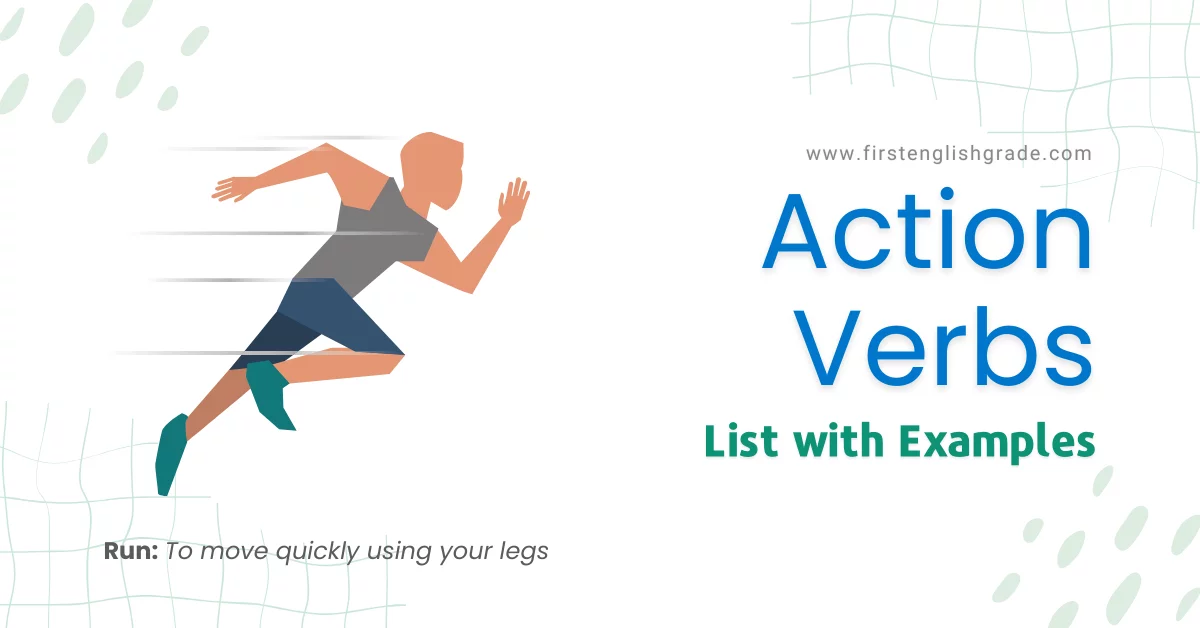
Verbs are one of the important parts of speech . Among them, action verbs are especially powerful. They give power to our expressions, infusing life and motion into our communications.
In this guide, we’ve collected a list of 100 action verbs. These words aren’t just regular words; they’re tools that help us describe actions. Whether it’s ‘run,’ ‘eat,’ ‘study,’ or ‘create,’ these verbs show what people do in our stories and conversations. We’ll explain each action verb and show you how to use them in sentences.
Action Verbs List:
Action verbs list: explanations and examples.
- Example: “She likes to run in the park every morning for exercise.”
- Example: “They decided to walk to the store instead of driving.”
- Example: “The athlete can jump over high hurdles easily.”
- Example: “He likes to eat fruits and vegetables for a healthy diet.”
- Example: “After a long day, she fell asleep as soon as she got into bed.”
- Example: “They like to talk about their favorite books.”
- Example: “He always listens carefully in class to understand the lesson.”
- Example: “She loves to sing along with her favorite songs.”
- Example: “The children giggled and danced around the room to their favorite song.”
- Example: “He enjoys spending his evenings reading novels.”
- Example: “She likes to write stories in her free time.”
- Example: “After considering all the options, he began to think that traveling might be the best choice.”
- Example: “When she saw her friends John and Ruby, she greeted them with a smile.”
- Example: “The comedy show made everyone laugh.”
- Example: “She cried when she watched the emotional movie.”
- Example: “My son needs to study for his upcoming exams.”
- Example: “They like to cook dinner together on weekends.”
- Example: “She decided to bake a cake for her friend’s birthday.”
- Example: “After the party, she diligently cleaned the kitchen, ensuring everything sparkled.”
- Example: “He swept the floors of the cafe before opening, ensuring a tidy environment for customers.”
- Example: “She washed the dishes after dinner.”
- Example: “He brushes his teeth twice a day.”
- Example: “She learned how to drive a car last year.”
- Example: “They plan to fly to Europe for their vacation.”
- Example: “We enjoy swimming in the ocean during the summer.”
- Example: “They climbed to the top of the mountain.”
- Example: “My brother and I love to hike in the national park.”
- Example: “Children love to play with their toys.”
- Example: “He works as a software engineer.”
- Example: “She likes to create artworks using different mediums.”
- Example: “He often enjoys painting landscapes in his spare time.”
- Example: “Amelia likes to draw portraits of her friends.”
- Example: “I am designing a poster for the new campaign.”
- Example: “The company plans to build a new office building.”
- Example: “Despite the challenge, he was determined to solve the riddle.”
- Example: “She likes to organize her desk every morning.”
- Example: “He manages a team of employees at the company.”
- Example: “He decided to teach himself how to play the guitar by watching online tutorials.”
- Example: “He learns new languages by practicing regularly.”
- Example: “She understood the instructions clearly.”
- Example: “Tom remembered his friend’s birthday and sent her a gift.”
- Example: “She forgot her keys and had to return home to get them.”
- Example: “They plan to travel to Europe next summer.”
- Example: “Sarah arranged a surprise party for her sister’s graduation.”
- Example: “The doctor scheduled a follow-up appointment for next month.”
- Example: “They decided to participate in the charity run.”
- Example: “The researchers collaborated on a ground-breaking study in medicine.”
- Example: “John communicates his ideas effectively during team meetings.”
- Example: “They tend to argue about politics during family gatherings.”
- Example: “They finally agreed on a place to have dinner.”
- Example: “They often disagree about the best way to solve problems.”
- Example: “His parents always support his decision to pursue his passion for music.”
- Example: “Some politicians oppose the proposed changes to the healthcare system.”
- Example: “He helped his neighbor carry groceries into the house.”
- Example: “The teacher’s assistant helped students with their assignments.”
- Example: “The restaurant staff serves customers with a smile.”
- Example: “They volunteered to clean up the local park on Earth Day.”
- Example: “They donated clothes to the charity for the homeless.”
- Example: “They contributed their ideas to the group project.”
- Example: “Citizens have the right to vote for their leaders.”
- Example: “They protested against unfair treatment in the workplace.”
- Example: “He defended his opinion during the debate.”
- Example: “The hacker’s attempt to attack the company’s network was unsuccessful.”
- Example: “Jane loves to explore different cuisines from around the world.”
- Example: “She discovered an old journal dating back to the 19th century.”
- Example: “The police are investigating the robbery.”
- Example: “They decided to experiment with a new recipe.”
- Example: “The quality control team will test the new product before its launch.”
- Example: “She analyzed the data to draw conclusions.”
- Example: “They need to evaluate the effectiveness of the program.”
- Example: “The teacher will assess the students’ understanding of the topic.”
- Example: “They aim to improve their customer service.”
- Example: “The company is developing new technology.”
- Example: “They constantly innovate to stay ahead in the market.”
- Example: “He had to adapt to the new work environment.”
- Example: “They decided to change their travel plans at the last minute.”
- Example: “The caterpillar transformed into a butterfly.”
- Example: “Technology has evolved rapidly in the past decade.”
- Example: “Plants need sunlight and water to grow.”
- Example: “He matured significantly after experiencing various life challenges.”
- Example: “The Company plans to expand its business internationally.”
- Example: “The woolen sweater shrank after being washed in hot water.”
- Example: “They try to reduce their energy consumption.”
- Example: “They need to increase their productivity to meet the deadline.”
- Example: “The Company decided to decrease its expenses.”
- Example: “He asked them to stop talking during the movie.”
- Example: “She will start her new job next Monday.”
- Example: “They decided to begin their journey early in the morning.”
- Example: “The meeting will end in fifteen minutes.”
- Example: “She finished her homework before dinner.”
- Example: “He completed the project ahead of schedule.”
- Example: “She succeeded in passing her driving test.”
- Example: “He failed to submit the assignment on time.”
- Example: “Their team won the championship.”
- Example: “They lost the match by a narrow margin.”
- Example: “He achieved his goal of running a marathon.”
- Example: “She accomplished all the tasks on her to-do list.”
- Example: “The construction of the building is progressing well.”
- Example: “She meditates every morning to start her day calmly.”
- Example: “He learned to navigate using a map and compass.”
Leave a Comment Cancel reply
Save my name, email, and website in this browser for the next time I comment.
- Dictionaries home
- American English
- Collocations
- German-English
- Grammar home
- Practical English Usage
- Learn & Practise Grammar (Beta)
- Word Lists home
- My Word Lists
- Recent additions
- Resources home
- Text Checker
Definition of travel verb from the Oxford Advanced American Dictionary
Want to learn more?
Find out which words work together and produce more natural-sounding English with the Oxford Collocations Dictionary app. Try it for free as part of the Oxford Advanced Learner’s Dictionary app.

An official website of the United States government.
If you want to request a wider IP range, first request access for your current IP, and then use the "Site Feedback" button found in the lower left-hand side to make the request.
- International edition
- Australia edition
- Europe edition

Premier League team news: predicted lineups for the weekend action
Leaders Arsenal travel to bitter rivals Tottenham on Sunday before Manchester City go to relegation-threatened Nottingham Forest
WEST HAM v LIVERPOOL
Saturday 12.30pm TNT Sports 1 Venue London Stadium
Referee Anthony Taylor This season G23 Y122 R3 5.43 cards/game

Subs from Fabianski, Anang, Knightsbridge, Johnson, Mavropanos, Cresswell, Casey, Phillips, Ings, Cornet, Swyer, Mubama, Orford, Earthy, Ogbonna, Bowen
Doubtful Bowen (back), Areola (calf), Mavropanos (groin), Aguerd (ankle), Phillips (hamstring), Earthy (concussion)
Injured None
Suspended None
Form DLDWLL Leading scorer Bowen 15
Subs from Kelleher, Adrian, Quansah, Konaté, Tsimikas, Jones, Clark, Szoboszlai, Gravenberch, Bajcetic, Gordon, McConnell, Danns, Núñez
Doubtful Bajcetic (calf)
Injured Bradley (ankle, 5 May), Jota (hip, 5 May), Thiago (muscle, May), Matip (knee, Aug), Doak (knee, unknown)
Form WWDLWL Leading scorer Salah 17
FULHAM v CRYSTAL PALACE
Saturday 3pm Venue Craven Cottage
Referee Stuart Attwell This season G15 Y71 R4 5.00 cards/game
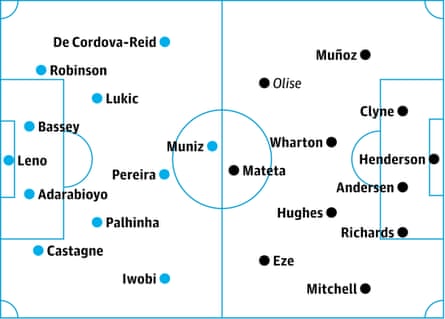
Subs from Rodak, Benda, Diop, Ream, Tete, Ballo-Touré, Reed, Cairney, Willian, Traoré, Broja, Jiménez, Wilson
Doubtful Willian (groin)
Form WDLLWL Leading scorer Muniz 8
Crystal Palace
Subs from Matthews, Tomkins, Riedewald, Rak-Sakyi, Schlupp, Ahamada, Ozoh, Plange, Édouard, Ayew, Umeh-Chibueze
Doubtful Rak-Sakyi (fitness)
Injured Guéhi (knee, 6 May), Lerma (hamstring, 6 May), Doucouré (achilles, 19 May), Johnstone (elbow, Jun), França (groin, unknown), Holding (hamstring, 6 May)
Form DLLWWW Leading scorer Mateta 11
MANCHESTER UNITED v BURNLEY
Saturday 3pm Venue Old Trafford
Referee John Brooks This season G20 Y84 R4 4.40 cards/game
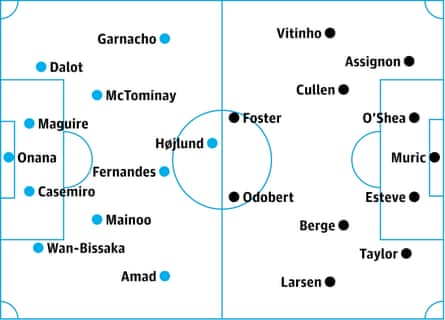
Manchester United
Subs from Bayindir, Heaton, Amrabat, Eriksen, Mount, Diallo, Antony, McNeill, Collyer, Ogunneye, Kambwala, Rashford, Forson, Jackson, Wheatley
Doubtful Kambwala (knock), Mount (knock), Rashford (knock)
Injured Evans (muscular, 24 Apr), Martínez (calf, 4 May), Lindelöf (hamstring, 4 May), Varane (foot, 4 May), Shaw (muscular, 19 May), Forson (unknown, unknown), Malacia (knee, unknown), Martial (groin, unknown)
Form WDLDDW Leading scorer Fernandes 10
Subs from Trafford, Vigouroux, Delcroix, Ekdal, Cork, Benson, Gudmundsson, Trésor, Rodriguez, Amdouni, Brownhill, Fofana
Doubtful None
Injured Koleosho (knee, 19 May), Redmond (leg, Jul), Ramsey (knee, Nov), Beyer (knock, Jun), Al-Dakhil (unknown, Jun, Massengo (unknown, unknown)
Form WDDLDW Leading scorer Bruun Larsen, Foster 5
NEWCASTLE v SHEFFIELD UNITED
Saturday 3pm Venue St James’ Park
Referee Tony Harrington This season G8 Y33 R1 4.25 cards/game

Subs from Karius, Gillespie, Dummett, Livramento, Wilson, Ritchie, Hall, White, A Murphy
Doubtful Livramento (ankle)
Injured Pope (shoulder, 11 May), Trippier (calf, 11 May), Almiron (knee, 4 May), Joelinton (thigh, 19 May), Targett (thigh, Jun), Botman (knee, Jan), Miley (back, Aug), Lascelles (knee, Jan), Willock (achilles, Aug)
Suspended Tonali (Aug 27)
Form LWDWWL Leading scorer Isak 17
Sheffield United
Subs from Grbic, Larouci, McAtee, Slimane, Robinson, Curtis, Osula, De Souza Costa, Brewster, Hampson
Doubtful Bogle (ankle), McAtee (unknown)
Injured Lowe (foot, unknown), Norrington-Davies (hamstring, Aug, Egan (achilles, May), Basham (ankle, unknown), Jebbison (illness, May), Baldock (calf, May), McBurnie (groin, Aug)
Form DLDLLL Leading scorer McBurnie 6
WOLVES v LUTON
Saturday 3pm Venue Molineux
Referee David Coote This season G14 Y77 R3 5.71 cards/game

Subs from Bentley, King, Doherty, Okoduwa, H Bueno, Traoré, Bellegrade, Holman, N Lemina, Fraser, González, Chirewa, Barnett
Doubtful S Bueno (hamstring), Bellegarde (knee)
Injured Neto (hamstring, 4 May), Dawson (ankle, Jun), Chiwome (ankle, Jun)
Form LDLDLL Leading scorer Cunha 11
Subs from Krul, Shea, Burke, Johnson, Nelson, Piesold, Mpanzu, Lokonga, Chong, Woodrow, Thorpe, Chigozie
Injured Adebayo (hamstring, 3 May), Ogbene (hamstring, 11 May), Nakamba (knee, Jun), Kaboré (ankle, Jun), Bell (hamstring, unknown), Brown (knee, unknown), Andersen (calf, unknown), Potts (hamstring, unknown), Lockyer (medical, unknown)
Form DLLWLL Leading scorer Adebayo, Morris 9
EVERTON v BRENTFORD
Saturday 5.30pm Sky Sports Premier League Venue Goodison Park
Referee Darren England This season G10 Y48 R2 5.00 cards/game

Subs from Virginia, Lonergan, Coleman, Keane, Gueye, Gomes, Onyango, Metcalfe, Hunt, Warrington, Chermiti, Danjuma
Doubtful Calvert-Lewin (illness), Coleman (groin), Gueye (calf)
Injured Mykolenko (ankle, 3 May), Beto (head, 3 May), Patterson (hamstring, August), Dele (groin, June), Dobbin (ankle, unknown)
Form LDWLWW Leading scorer Calvert-Lewin, Doucouré 6
Subs from Strakosha, Valdimarsson, Kim, Roerslev, Jørgensen, Ghoddos, Yarmolyuk, Nørgaard, Emre Konak, Baptiste, Toney, Schade, Lewis-Potter
Doubtful Toney (hip)
Injured Hickey (hamstring, Jun), Mee (ankle, Jun), Henry (knee, Jun), Dasilva (knee, Jun), Mee (ankle, Jun)
Ineligible Maupay (parent club)
Form LDDDWW Leading scorer Wissa 10
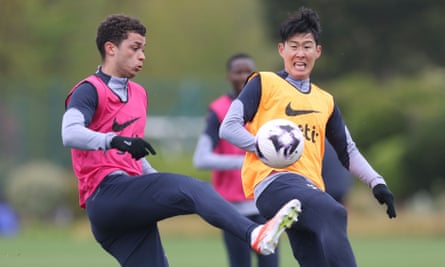
ASTON VILLA v CHELSEA
Saturday 8pm TNT Sports 1 Venue Villa Park
Referee Craig Pawson This season G16 Y70 R3 4.56 cards/game
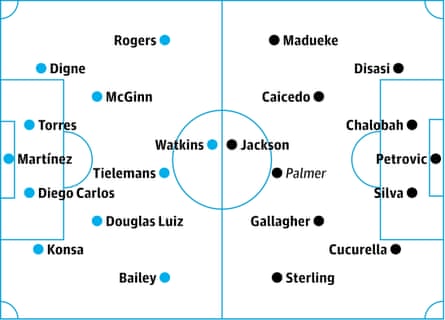
Aston Villa
Subs from Olsen, Gauci, Cash, Lenglet, Chambers, Hause, Kesler-Hayden, Iroegbunam, Kellyman, Diaby, Durán, Zaniolo, Munroe
Doubtful Zaniolo (knock)
Injured Moreno (calf, May), Ramsey (toe, Jun), Buendía (knee, Jun), Mings (knee, Jun), Kamara (knee, Sep)
Form DWLDWW Leading scorer Watkins 19
Subs from Sánchez, Bettinelli, Badiashile, Casadei, Silva, Chilwell, Gilchrist, Acheampong, Washington, Dyer, George, Chukwuemeka, Madueke, Mudryk, Samuels-Smith, Murray-Campbell, Tauriainen, Golding, Gusto
Doubtful Sánchez (illness), Chilwell (knee), Gusto (knee), Palmer (illness)
Injured Colwill (foot, unknown), Nkunku (thigh, 3 May), Ugochukwu (knee, 19 May), Fofana (knee, unknown), James (hamstring, unknown), Lavia (thigh, Jun), Fernández (groin, Jun)
Suspended Chelsea
Form WDWDWL Leading scorer Palmer 20
BOURNEMOUTH v BRIGHTON
Sunday 2pm Venue Vitality Stadium
Referee Paul Tierney This season G22 Y79 R3 3.73 cards/game

Bournemouth
Subs from Travers, Radu, Hill, Aarons, Mepham, Kinsey-Wellings, Scott, Billing, Unal, Dacosta, Sadi
Doubtful Mepham (illness)
Injured Tavernier (hamstring, 11 May), Sinisterra (hamstring, 19 May), Faivre (hamstring, 19 May), Adams (back, unknown)
Suspended Kerkez (first of three)
Form WWLDLW Leading scorer Solanke 18
Subs from Steele, Hall, Webster, Offiah, Barco, Moder, Lallana, Baker-Boaitey, Fati, Welbeck, O’Mahony, Peupion
Injured Gilmour (knee, May), Milner (muscle, May), Mitoma (back, Jun), Ferguson (ankle, Jun), Estupiñán (ankle, Jun), Hinshelwood (foot, Jun), March (knee, Jun), Lamptey (knock, unknown)
Form WLDLD? Leading scorer ?Pedro? ?8?
TOTTENHAM v ARSENAL
Sunday 2pm Sky Sports Premier League Venue Tottenham Hotspur Stadium
Referee Michael Oliver This season G21 Y84 R5 4.24 cards/game

Subs from Austin, Emerson, Dragusin, Bentancur, Højbjerg, Lo Celso, Gil, Santiago, Donley, Werner, Kulusevski, Scarlett
Injured Solomon (knee, unknown), Sessegnon (hamstring, season), Forster (foot, May), Udogie (muscular, season), Skipp (knock, unknown)
Form WLWDWL Leading scorer xnamex
Subs from Ramsdale, Hein, Tomiyasu, Kiwior, Soares, Partey, Elneny, Vieira, Smith Rowe, Nelson, Martinelli, Jesus, Nketiah
Injured Timber (knee, unknown)
Form DWWLWW Leading scorer Son 15
NOTTINGHAM FOREST v MANCHESTER CITY
Sunday 4.30pm Sky Sports Premier League Venue City Ground
Referee Simon Hooper This season G22 Y105 R3 4.91 cards/game
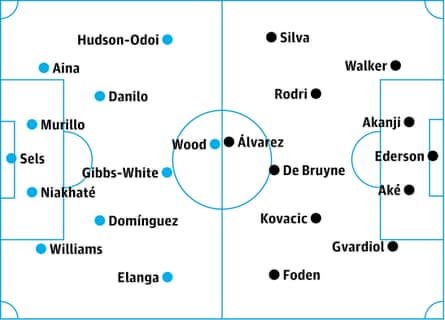
Nottingham Forest
Subs from Turner, Vlachodimos, Hennessey, Felipe, Montiel, Tavares, Toffolo, Kouyaté, Sangaré, Yates, Ribeiro, Origi, Reyna, Omobamidele
Injured Awoniyi (thigh, unknown), Boly (hamstring, unknown)
Form DDWLDL Leading scorer Wood 12
Manchester City
Subs from Carson, Gomez, Bobb, Susoho, Ortega, Grealish, Nunes, Doku, Lewis, Haaland, Stones, Dias
Doubtful Haaland (muscle)
Form DDWWW? Leading scorer Haaland 20
- Premier League
- Match previews
Most viewed
Advertisement
Coming to Alabama: Newsom’s Abortion-Access Ad, Depicting an Arrest
The ad portrays a woman trying to leave the state to have an abortion. The Campaign for Democracy, a political action committee started by Mr. Newsom, the California governor, created it.
- Share full article

By Neil Vigdor
- April 21, 2024
A woman nervously peers into her rearview mirror as a patrolman activates his car’s lights and sirens. She is less than a mile from leaving Alabama to seek abortion services, but it’s too late: The next thing she knows, she is being handed a pregnancy test and is handcuffed.
The encounter is depicted in an unvarnished new television ad called “Fugitive.” The Campaign for Democracy, a political action committee created by Gov. Gavin Newsom, Democrat of California, produced the ad.
It will appear on Monday in Alabama, where Republicans have called for prosecuting women who travel elsewhere for an abortion. The state’s abortion ban, one of the nation’s strictest, outlaws the procedure at all stages of pregnancy, with no exceptions for rape and incest.
“Trump Republicans want to criminalize young Alabama women who travel for reproductive care,” the ad’s narrator says.
The ad then shows the patrolman approaching the vehicle: “Miss, I’m going to need you to step out of the vehicle,” he says, tapping the kit on the driver’s side door, “take a pregnancy test.”
The ad is scheduled to run on broadcast and cable television, along with digital platforms like YouTube, for two weeks, according to the PAC. The cost of the ad buy was not immediately available.
Alabama’s attorney general, Steve Marshall, a Republican, has clashed with the Justice Department and abortion assistance providers over whether the state has the authority to prosecute individuals or groups that help women leave the state to have the procedure.
Last month, Republicans introduced a bill in the Alabama House that would make it a misdemeanor to harbor or transport a minor to seek abortion services.
Mr. Newsom has emerged as a key surrogate for President Biden while harboring future White House ambitions of his own. He has regularly skirmished with G.O.P. governors and Republican-led states over abortion access, immigration, crime and other issues.
While Republicans have seized on crossings at the southern border in their messaging, Democrats have harnessed the issue of abortion-access after the U.S. Supreme Court overturned Roe v. Wade in 2022. It helped propel Democratic candidates to key victories during the midterm elections in 2022 and in races last year.
In February, the Alabama Supreme Court ruled that frozen embryos were people with rights, casting a cloud of uncertainty over in vitro fertilization. The state later passed a law giving I.V.F. clinics criminal and civil immunity, but it did not address whether embryos have the legal status of human beings.
In another seismic ruling, the Arizona Supreme Court this month upheld an 1864 law that bans nearly all abortions. The decision could have far-reaching consequences for women’s health care and election-year politics in the state, a critical political battleground.
Mr. Newsom said in a social media post at the time that California, which borders Arizona, would provide a refuge for women affected by the decision.
“Arizona wasn’t even a state — it was a territory — when this draconian abortion ban was passed,” he said. “That’s how extreme this is. California remains ready to help Arizonans access reproductive health care.”
Neil Vigdor covers politics for The Times, focusing on voting rights issues and election disinformation. More about Neil Vigdor
We've detected unusual activity from your computer network
To continue, please click the box below to let us know you're not a robot.
Why did this happen?
Please make sure your browser supports JavaScript and cookies and that you are not blocking them from loading. For more information you can review our Terms of Service and Cookie Policy .
For inquiries related to this message please contact our support team and provide the reference ID below.

IMAGES
VIDEO
COMMENTS
An action verb is a type of verb that describes the action that the subject of a sentence is performing. Action verbs can refer to both physical and mental actions (i.e., internal processes and actions related to thinking, perceiving, or feeling). Examples: Physical and mental action verbs. We climbed to the highest peak.
Pin. Phrasal Verbs for Travel with Meaning and Examples Check in. Meaning: to register at a hotel or an airport. Example: We need to check in at least two hours before the flight. Check out. Meaning: to settle one's bill and leave a hotel or other accommodation. Example: We checked out of the hotel early in the morning.; Drop by. Meaning: to visit someone or somewhere briefly, usually ...
Verbs are the backbone of sentences, and action verbs, in particular, add movement and dynamism to our language. In this blog post, we'll break down what action verbs are, provide examples to illustrate their use, and discuss how they differ from stative and linking verbs.
Action Verbs. An action verb describes an action, such as: The sentence pattern will be: SUBJECT → ACTION VERB → THE REST OF THE SENTENCE. (noun, pronoun, or noun phrase) → (verb) → (adjective, adverb, noun, prepositional phrase, etc.) Examples of action verbs in sentences: Greg is kicking the ball now. The action verb is Kicking.
Part 1 - Phrasal Verbs to Use When Booking/Planning Your Trip. Get away - To leave and go somewhere for a break or holiday. Ex. "You need to get away for a few weeks and recharge your batteries. Dream of - To think about or wish for something you want very much. Ex.
Pin. Related: A big list of verbs in English and action verbs in English grammar.. List of Common Action Verbs with Pictures and Examples Ride "Ride" is a verb that means to travel on or in a vehicle or animal. Example: I love to ride my bike to the park on sunny days.
Define action verb: The definition of action verb is a verb that expresses the action of the subject; a verb that does something and the subject can complete. In summary, Action verbs are any verb that a subject can do. Action verbs can be transitive or intransitive verbs. Additionally, only action verbs (not non-action verbs) can be used in ...
What is an action verb? An action verb describes an action that a person, animal, object, or process in nature can do.For example, a cheetah chases gazelles across a plain, and the gazelles sprint away, hearing the tall grass rustle underneath the lion's paws.. In the sentence above, there are several verbs that describe action; the cheetah chases the gazelles, and the gazelles hear the ...
Pick up - to go and fetch someone from a place and take them somewhere else. Set out - to start a journey. Take off - when a plane leaves and begins to fly. Get in - when a plane arrives on an airport. Get away - to leave to go somewhere for a break or holiday. Get on - to climb on board. Speed up - to increase speed.
Travel verbs, as their name suggests, are action words related to journeys or trips. They're not just about physical movement but also encapsulate experiences encountered during travels. ... Some travel verbs don't solely apply to physical journeys but also metaphorical ones! An example is "embark," which can signify starting an ...
Phrasal Verbs Related to Travel. Set off: To begin a journey. "We set off really early this morning, that's why I'm so tired. Get away: To go away on holiday, to escape for a while "I'm really stressed at work and what I really need is to get away. Take off: When the plane leaves the ground.
Action verbs are essential to speaking and writing. These key verb examples show physical or mental action. This list shows how exciting verbs can be!
Action verbs are verbs which express a physical action/movement. The action verb tells us what the subject of the sentence is doing. We do hundreds if not thousands of actions every day. Let me tell you about my morning routine: I wake up then I get up. I make breakfast then eat it.
Action or dynamic verbs, also known as active or event verbs, are used to indicate an action or physical activity. Action verbs are different from stative verbs, which express states of being or conditions, and from linking verbs which function as bridges that link subjects to subject complements. Let's look at the following sentences:
Conjugate the English verb travel: indicative, past tense, participle, present perfect, gerund, conjugation models and irregular verbs. Translate travel in context, with examples of use and definition.
An action verb, also known as a dynamic verb, is a verb that expresses a mental or physical action.This is the opposite of a stative verb that expresses a passive state such as "know", "believe" or "regret." Action verbs are commonly used in business to express strategy, goals, objectives, job descriptions and to report business progress.
The correct answer would be "went.". Matching: In this exercise, you will be given a list of past tense verbs and a list of travel-related words. Your task is to match the past tense verb with the correct travel-related word. For example, "flew" would match with "airplane.". Written Exercises.
Some wines do not travel well. [intransitive] travel (well) (of a book, an idea, etc.) to be equally successful in another place and not just where it began. These recipes travel well and don't require unusual ingredients or equipment. Some writing travels badly (= is not successful) in translation. [intransitive] to go fast. Their car can ...
Action verbs are also called dynamic verbs. There are many actions used in English, the action verbs, unlike the others, indicate the work done in the sentence, the reader gives information about the actions performed, specifies specifically what the subject in the sentence does. Some of the Action Verbs: eat. catch. sleep.
Action Verbs List: Explanations and Examples. Run: To move quickly using your legs. Example: "She likes to run in the park every morning for exercise.". Walk: To move at a regular pace by stepping with alternate feet. Example: "They decided to walk to the store instead of driving.". Jump: To propel oneself quickly upward or a distance.
1 [intransitive, transitive] to go from one place to another, especially over a long distance to travel around the world I go to bed early if I'm traveling the next day. I love traveling by train. We always travel first class. We traveled to California for the wedding. When I finished college I went traveling for six months (= spent time visiting different places). travel something He traveled ...
Conjugation of the verb Travel in all tenses: future, present and past. 🎮 Conjugation trainer for memorizing forms.
Action Verb classroom activities can include, worksheets card games, ordering exercises and verbal games. You can also play games like charades and Simon says in a classroom environment as well. We have detailed some for you with resources below. Action Verb Uno: This is a variant of the evergreen card game Uno. We have added Action verbs to ...
Purpose and Need for Action. Pursuant to the Travel Management Rule at 36 CFR 212 subpart C, ... Approximately 315,000 acres are proposed as areas open for all classes of cross-country motorized over-snow travel from December 1 to March 31 and would be closed to motorized over-snow vehicle use on March 31 each year to accommodate grizzly bear ...
Leaders Arsenal travel to bitter rivals Tottenham on Sunday before Manchester City go to relegation-threatened Nottingham Forest
The ad portrays a woman trying to leave the state to have an abortion. The Campaign for Democracy, a political action committee started by Mr. Newsom, the California governor, created it.
Technicians at a company that repairs and maintains Air India Ltd. aircraft have called off a strike planned for Tuesday, easing concerns that the industrial action could spark a renewed bout of ...